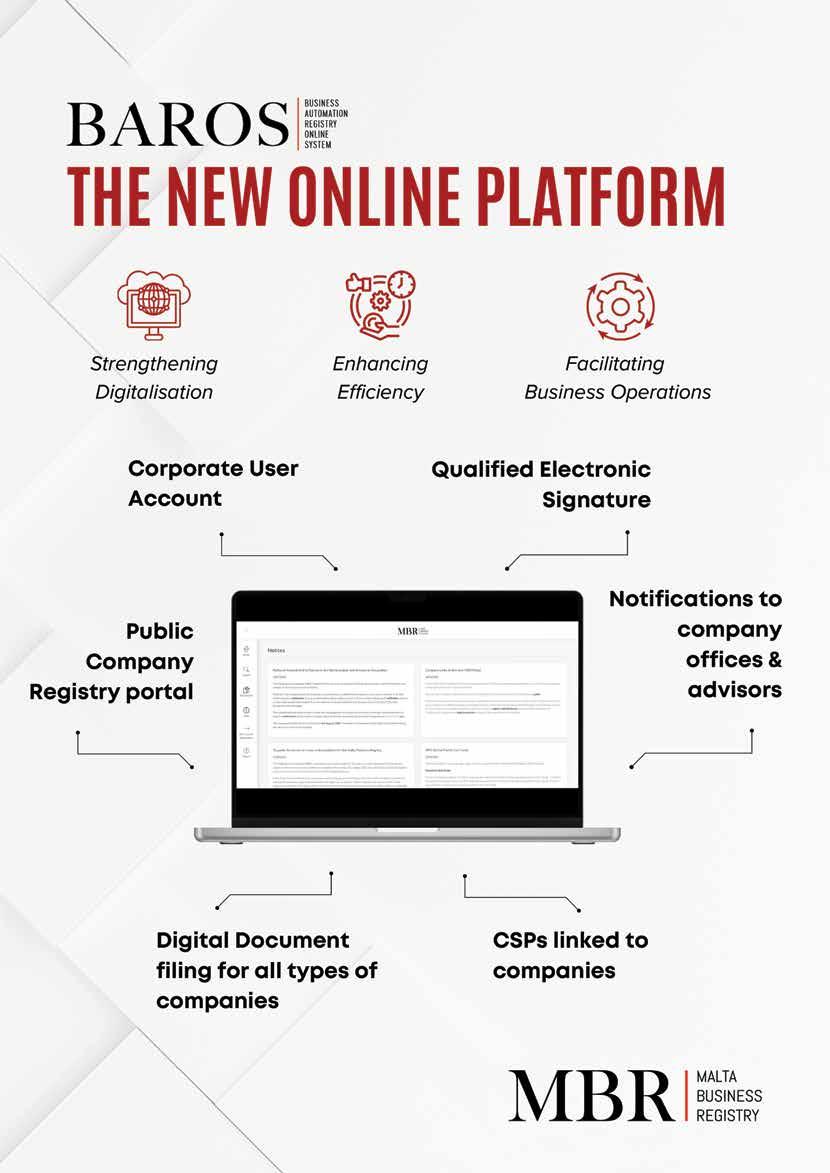Business Now 2024

















































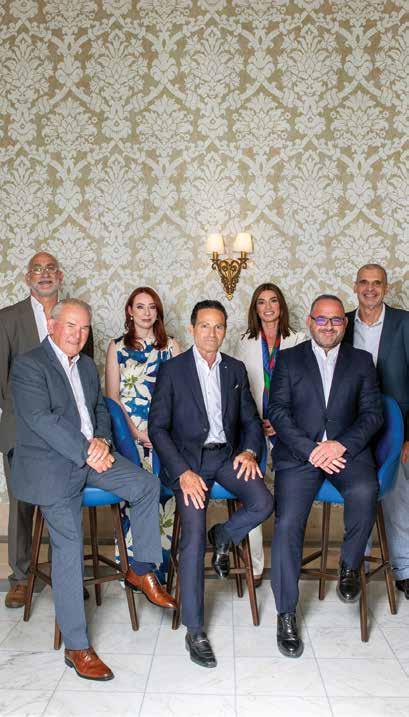
BALANCING GROWTH AND SUSTAINABILITY: MALTA’S ECONOMIC MODEL UNDER THE MICROSCOPE
Sarah Muscat Azzopardi seeks the insights of Malta’s business leaders, economists, and heads of local industry organisations to explore the factors driving the country’s economic momentum.

Interview THE SPARK TO IGNITE A GLOBAL INFRASTRUCTURE REVOLUTION
Max Thake, the co-founder of peaq, a digital ecosystem launching this year, talks to Rebecca Anastasi about a new era of AI-powered technology.
40
SMALL ISLAND, BIG VOICES: INSIDE MALTA’S PODCASTING BOOM
Sarah Muscat Azzopardi picks the brains of prominent Maltese podcasters Melanie Kelly, Peter Grech, and Trudy Kerr about the surging popularity of podcasts in Malta.
46

BUILDING A SOLID LEGACY OF EXCELLENCE
For almost five decades, AX Group has been synonymous with ambitious hospitality and development projects moulded by the firm’s core values: creativity, integrity, and determination. Rebecca Anastasi traces the Group’s evolution as it stands poised to celebrate its 50th anniversary.
SAVOURING MALTA: TOP CHEFS ON FAVOURITE RECIPES AND LOCAL CUISINE
Sarah Muscat Azzopardi dives into the kitchens and minds of some of Malta’s most celebrated chefs to explore the flavours, inspirations, and personal reflections that shape the island’s contemporary cuisine, straight from the source.
REVIVING HISTORY: A NEW VISION FOR VILLA LUGINSLAND
Omenaa Mensah, the founder of the OmenaArt Foundation and the driving force behind the rebranded LuginsLand of Art, speaks to Sarah Muscat Azzopardi about the restoration of Villa Luginsland.
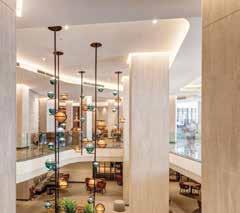
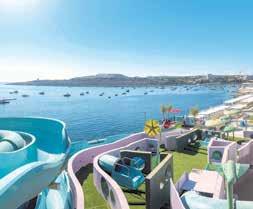
AN ARCHAEOLOGY OF BELONGING
Coveted by international investors and collectors, Maltese artist Ġoxwa Borg’s paintings exude a timeless quality. Fresh from another tour-de-force solo exhibition, the Paris-based artist meets Warren Joseph Bugeja

PRESERVING MALTA’S CULTURAL IDENTITY IN THE FACE OF MODERN CHALLENGES
Sarah Muscat Azzopardi discovers what newly appointed executive president of Din l-Art Helwa Patrick Calleja has in store at the helm of Malta’s National Trust.

DRAWING INSIGHTS FROM KEY INDUSTRY FIGURES, the latest edition of Business Now provides a snapshot of Malta’s unique business landscape, offering analysis and forecasts into what lies ahead for the local economy.
First, we examine the sustainability of the island’s robust economic growth, asking Malta’s business leaders, economists, and heads of local industry organisations for their perspectives on the factors driving economic momentum.

We also feature an interview with young tech entrepreneur Max Thake, whose blockchain token has just raised €20 million on CoinList, as well as with executive president of Din l-Art Helwa Patrick Calleja, who has recently taken over from architect Alex Torpiano.
Elsewhere in the issue, we pick the brains of prominent Maltese podcasters about the surging popularity of podcasts in Malta, before exploring the kitchens and minds of some of Malta’s most celebrated chefs. Then, in our Industry Greats feature, we trace the remarkable evolution of AX Group as it stands poised to celebrate its 50th anniversary in 2025.
We also mix a little business with pleasure in this edition, discovering the restoration story of Rabat’s historic Villa Luginsland (pictured here), which, once restored, will partly be transformed into a creative hub where art and business can intertwine. Finally, our creative journey reaches its final destination with an inspiring chat with Paris-based artist Ġoxwa Borg.
Enjoy the issue,
Sarah Muscat Azzopardi

PUBLISHER
Content House
Quad Central, Q2, Level 2, Central Business District, CBD 1040 Tel: 2132 0713 info@contenthouse.mt www.contenthouse.mt
EDITOR
Sarah Muscat Azzopardi
HEAD OF SALES & BUSINESS DEVELOPMENT
Marie Claire Camilleri
OPERATIONS AND CLIENT RELATIONSHIP MANAGER
Sue Ann Pisani
ADMINISTRATION & CLIENT RELATIONSHIP EXECUTIVE
Rodianne Sammut
CREATIVE DIRECTOR & DESIGN
Nicholas Cutajar
COVER PHOTO
Bernard Polidano – Shot on location at The Phoenicia Malta
Content House would like to thank all the protagonists, contributors, partners, advertisers, and the creative team that have made this publication a success.
Articles appearing in this publication do not necessarily reflect the views of Content House. All rights reserved. Reproduction in whole or in part without written permission of the publishers is strictly prohibited.
Business Now is the largest business magazine of its kind, published by Content House, one of Malta’s largest media organisations. Business Now Magazine is the sister brand of BusinessNow.mt, Malta’s fastest-growing business news portal. This publication is distributed to leading companies and businesses operating in different sectors including those in the services sector, manufacturing, retail, ICT and software development, importation, shipping and freight, recruitment, accountancy and audit, corporate and legal, communications, new technology, and many more.
Business Now’s exclusive distribution network also reaches leading CEOs and business leaders. The business magazine is also distributed to creative and marketing agencies, Government ministries, departments and entities, embassies and consulates, banks, and architecture firms, as well as to car showrooms, business centres and yacht marinas. Beyond the free distribution network, Business Now is also available at leading newsagents around Malta. FOLLOW US ON
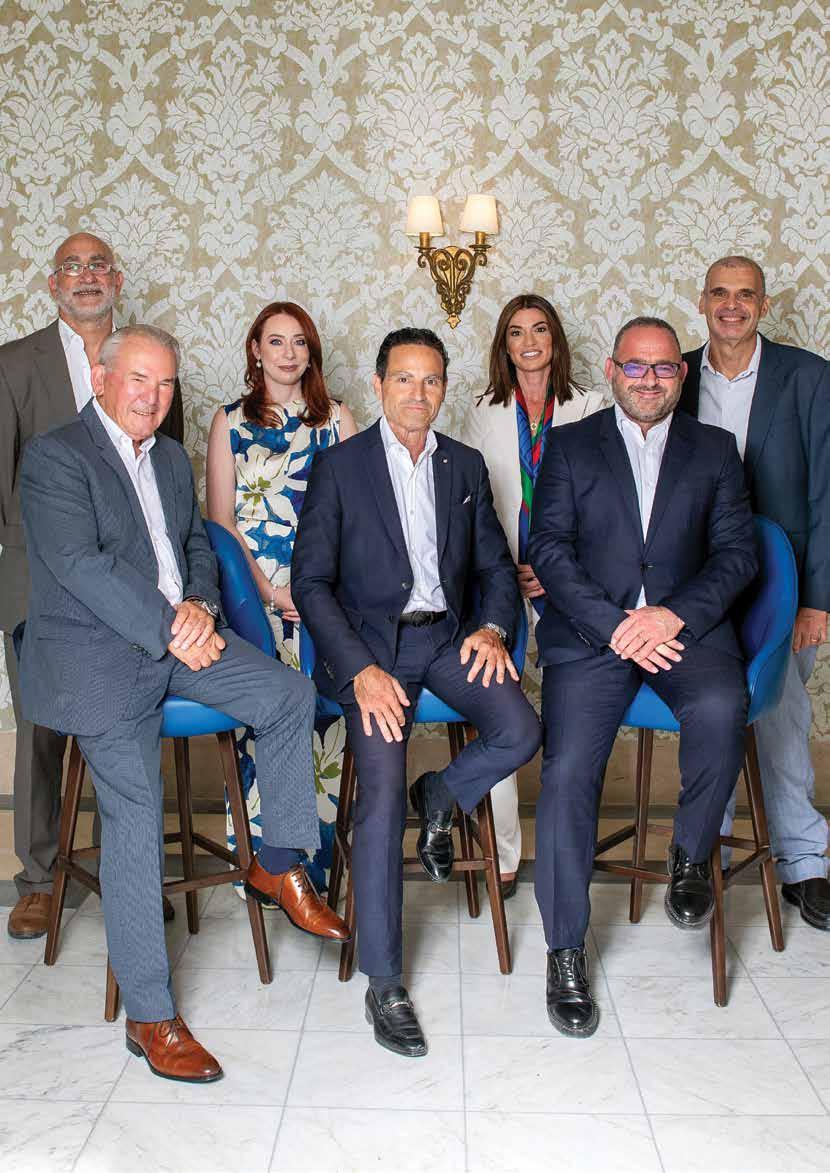
Malta’s economy has demonstrated remarkable resilience and growth in recent years, weathering global economic upheavals and consistently posting impressive performance indicators. From record-breaking tourism figures to a booming construction sector, the island has become a model of economic success, but as Malta’s economic landscape continues to evolve, questions have arisen about the sustainability of its current growth model. With this in mind, Sarah Muscat Azzopardi seeks the insights and perspectives of Malta’s business leaders, economists, and heads of local industry organisations to explore the factors driving the country’s economic momentum.
‘The present economic model requiring the importation of an additional 20,000 workers annually is unsustainable and is pushing the country’s infrastructure to breaking point’
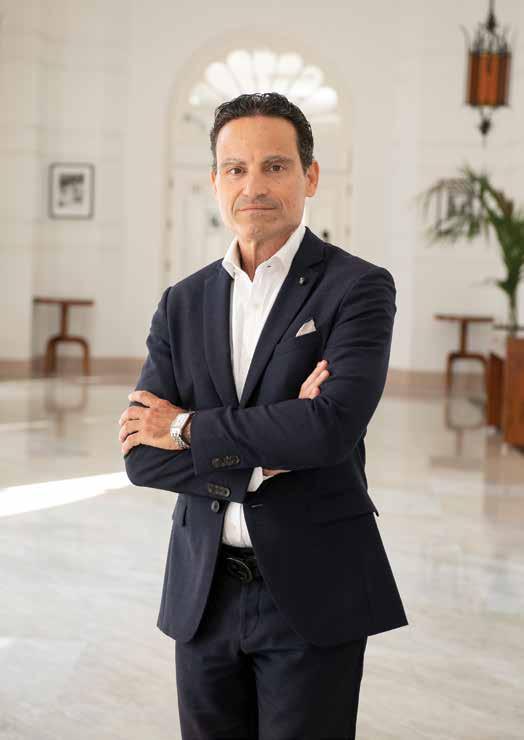
Chris Vassallo Cesareo is the President of the Malta Chamber of Commerce, Enterprise and Industry, the independent voice of the private sector in Malta.
Describing it as “labour-intensive”, Chris believes that Malta’s economic growth model needs to be put on more sustainable footing, whereby economic growth can be achieved with less labour input to improve the quality of life and rein in the stress on Malta’s infrastructure.
“Our bottom-line GDP will only continue to grow if there is a clear strategy that addresses what is increasingly meaning more to people and to sustainable business models. Otherwise, we will eventually be outpaced by our competitors on all fronts,” he warns, highlighting the Malta Chamber’s calls for Government to incentivise a shift towards an economic model which is not dependent on increasing the population.
“The present economic model requiring the importation of an additional 20,000 workers annually is unsustainable
and is pushing the country’s infrastructure to breaking point,” the Chamber President asserts.
According to Chris, considerations around a new economic model for Malta point towards a high value-added economy. “The influx of migrants we have experienced in recent years has contributed very marginally to our skills pool. At the same time, it is indisputable that many businesses and industries cannot survive, let alone thrive, without foreign workers supplementing the local workforce, given our tight labour market and evident skills gaps which are hindering growth across all business sectors. However, our country cannot keep depending primarily on third-country nationals for all labour shortages,” he maintains, emphasising the need for a more strategic offering.
Furthermore, he notes, “our country needs to rethink and overhaul our current education system, and there also needs to be increased impetus in the implementation of automation strategies.”
Turning his attention to the real estate and construction sector, the President states that a holistic approach to planning isn’t just a preference – it’s essential. “The Malta Chamber strongly believes that the country must move away from piecemeal policy development and adopt comprehensive planning strategies that address all aspects of development,” he affirms, emphasising the need for factoring in the country’s aesthetics and infrastructure, as well as the country’s carrying capacity, economic vision and the overall quality of life.
Moreover, despite continued record-breaking tourism numbers, Chris believes that Malta should look beyond the number of bed nights and the amount spent per head, and simply drawing up comparisons to previous months or years. “If we want to get the true picture, we need to look at the real per capita expenditure and the real per night expenditure – official NSO statistics confirm that although the number of tourists may have increased, their spending power has decreased in real terms. We also need
to benchmark ourselves against our competition. Some Mediterranean countries we compete with had percentage increases much greater than Malta’s,” he warns, urging the authorities to prioritise quality experiences over numerical influx, and to promote Malta’s uniqueness in terms of culture, heritage and history.
Moving forward, the Chamber President believes that Malta needs to be looking at sectors which are already thriving but that also have good potential for value-added and sustainable growth, including manufacturing, aviation, yachting, and the service-based industries.
“Currently, businesses are struggling with higher labour costs, higher financing costs and higher import costs. Businesses need to be supported to invest wisely in technology, as this will reduce their dependency on manual labour and improve value-added per employee. Government should also seek to help businesses align with SDGs and integrate ESG metrics in their operations – this will help Malta to adapt to the evolving landscape, mitigate risks and seize opportunities for long-term success while contributing to a more environmentally sustainable and responsible economic model,” he concludes.
‘The major driving forces of global business and the specific needs of our society and economy are converging towards the notion of ESG’
Gordon Cordina is a leading economist whose professional experience spans 25 years, covering banking, policymaking, academia, and private sector consultancy.
“We are living in a time when the major driving forces of global business and the specific needs of our society and economy are converging towards the notion of ESG,” says Gordon, referencing an investment principle that prioritises environmental, social, and corporate governance issues.
“Over the past 10 years, the ESG economy worldwide has been growing by eight per cent per annum. The EU leads globally in this area, with a 45 per cent,” share he maintains,, noting that the approach aligns strategically with Malta’s competitiveness advantages, which can be sustained in the long term.
This convergence presents the island with two opportunities, the economist believes: first, to embed ESG in all business activities as much as possible; and second, to develop new areas where ESG investment is the primary focus.

Acknowledging that implementing these changes requires a concerted effort from all levels of governance, including the public sector, private business, and social actors, Gordon suggests, “one way to approach this challenge is to prioritise sectors that are both highly ESG-focused and economically sensitive, evaluated from both strengths/opportunities and weaknesses/threats perspectives.”
Construction is an obvious priority sector, he points out, due to its sensitivity to ESG factors, including land and landscape impacts, energy and water use, transportation, labour force, and population implications, both during the development phase and throughout eventual occupancy.
“Construction stimulates economic demand but carries the risk of overinvestment if not properly planned. Additionally, the high cost of land in Malta affects both the cost of living and business price competitiveness. Yet, construction is essential to human activity and development. If managed effectively with ESG considerations, it can enhance quality of life and potentially contribute more significantly to GDP,” he maintains.
Parallel considerations apply to tourism, transport, energy, and water services, the economist continues, pointing out that these sectors are fundamental to the economy, with significant environmental impacts and associated risks. However, they also offer important opportunities if developed with an ESG perspective.
At the other end of the spectrum, Malta could seek to develop ESGdriven specialisations in higher value-added activities, Gordon notes. “An ESG orientation can be integrated into the growth of IT, AI, digital business, financial services, and general consultancy services, including legal and accounting. The goal should be not only to serve the domestic economy but also to pursue export opportunities, possibly by participating in collaborative EU networks,” he states.
Meanwhile, the Blue Economy, Gordon continues, which in Malta remains relatively underdeveloped despite the country’s geographic characteristics, represents another area where ESG factors can be leveraged to build sustainable economic advantages across a wide spectrum of activities.
“This transformation will neither be easy nor quick,” he warns. “It is important to redirect attention and resources towards it as rapidly as possible to make it happen.”
‘The green and digital transition will be key in securing a performing economy’
Raphael Aloisio is President of the Malta Business Bureau (MBB), which represents the Malta Chamber and the Malta Hotels and Restaurants Association in Brussels and Malta.
“Malta has experienced consistent economic growth higher than the EU average for the past decade or so, except for the COVID-19 years,” begins Raphael, describing Malta’s growth in population and tourism arrivals as a doubled-edged sword which places potentially unsustainable pressures on an already over-stretched infrastructure.
Moving forward, the MBB President says that the country should focus on increased value-added rather than volume, arguing that “the green and digital transition will be key in securing a performing economy, and Malta should continue to invest funds derived from the EU Recovery and Resilience Fund towards this important priority.”

Stating that labour and skills shortages are common across the EU, Raphael says that labour mobility has significantly influenced Malta’s workforce, addressing specific shortages by attracting EU nationals, including in core and emerging sectors like finance, IT, manufacturing, hospitality, and healthcare.
“Last year, the European Commission proposed an action plan and several initiatives that could prove beneficial for Malta,” he notes, highlighting the proposed EU Talent Pool platform, which could provide Maltese employers with a more structured system of procuring talent from third countries; as well as the revision of the Quality Framework for Traineeships, which focuses on enhancing the quality and work experience of trainees.
Meanwhile, he continues, Malta’s real estate and construction sector is undergoing a significant transformation due to new EU regulations. “For instance, the revised Energy Performance of Buildings Directive introduces a stronger push towards improved energy performance of buildings,” he highlights, while “the Carbon Border Adjust Mechanism addresses construction materials specifically by introducing an additional cost on certain products imported from outside the EU which have high embedded emissions.”
These measures, according to Raphael, represent an opportunity to upgrade a sector which has so far lagged behind in terms of its environmental performance. “The construction sector must now prioritise sustainability and integrate green building standards into its projects. Nonetheless, a key challenge will undoubtedly be increases in construction costs, which can further impact real estate affordability. In the long term, increased efficiency and waste reduction may partly offset increased costs,” he states.
Commenting on the future of Malta’s tourism sector, the President contends that, while tourism has always been a critical sector, “stakeholders must not downplay the serious challenges posed by the real risk of exceeding our carrying capacity.”
Recent EU Green Deal legislation will ultimately result in higher transport costs for tourists due to additional environmental taxes that will be incurred by operators, Raphael states, highlighting that Malta’s product offering will become a more important component than price. “This requires a long-term vision with clear deliverables on upgrading the environment, investment in sustainable hospitality accommodation, as well as safeguarding and building on Malta’s rich heritage and culture,” he maintains.
Looking ahead, Raphael sees a potential economic opportunity in “increasing the presence of net-zero industries in Malta through investment in research, innovation, and ultimately production.” This is particularly relevant given the EU’s shift towards open strategic autonomy and the European Economic and Security Strategy, which, among others, aim to secure access to critical raw materials and promote the production of essential products within Europe.

‘Businesses need to adopt sustainability practices and innovate by integrating digital and automation tools, contributing to Malta’s economic transformation’
Abigail Mamo is the outgoing CEO of the Malta Chamber of SMEs, Malta’s national organisation of independent private businesses.
“Malta’s economic performance has been strong, marked by consistent GDP growth, low unemployment, and fiscal surpluses,” begins Abigail, highlighting the Central Bank’s forecasts of 4.3 per cent GDP growth rate for 2024. Attributing this primarily to domestic demand and net exports in the service sector, she also points to a diversified economy, as well as favourable conditions attracting significant foreign investment.
“Malta is dependent on foreign workers who contribute across all sectors, resulting also in a record high working-age population, constituting a third of the country’s total population. Despite this, Malta struggles to fill labour market gaps, with many employers reporting shortages due to skills mismatches,” she states, affirming that, with a larger majority of the foreign workers being low-skilled, systemic abuse has continued to exacerbate the issue.
“An inefficient labour market has led to challenges such as overpopulation, integration issues, and wage pressures, with labour market tightness remaining a predominant concern. These have heavily impacted society and the economy,” Abigal notes, adding that Government has started responding to these challenges and addressing the biggest abuses.
“This is likely to continue, together with a greater effort to finetune the focus on higher-quality workers, automation and digital skills, necessitating more investment in education and training to maintain competitiveness.”
Acknowledging that the real estate and construction sectors have significantly contributed to Malta’s GDP in recent years, the CEO believes it is now crucial to assess the quality of these contributions, calling for a specific, individual strategy for each sector. “Malta’s finite resources necessitate careful consideration of

future construction needs and limiting excess development. While construction has boosted GDP, it has also caused considerable discomfort and collateral damage,” she warns, noting that the rental market has been particularly impacted, with exponentially rising prices leading to overcrowded living conditions and wage inflation.
Meanwhile, identifying tourism as a critical component of Malta’s economy, Abigail believes that striking a balance that is progressive and aims for growth based on quality is essential. “The sector is highly competitive, with local enterprises not only competing amongst themselves but also with other destinations. Elevating service quality across the board is crucial to positioning Malta as a top destination,” she says.
Looking ahead at further areas for economic development, the CEO affirms that Malta is already highly diversified in terms
of sectors, and while new opportunities exist, the country should focus on transforming and enhancing existing sectors to increase SME competitiveness.
“The renewable energy sector, for example, has made significant strides but requires further product diversification and research to fully leverage Malta’s natural attributes. Businesses need to adopt sustainability practices and innovate by integrating digital and automation tools, contributing to Malta’s economic transformation,” she maintains, pointing also to promising sectors for investment including fintech, digital services in education and health, AI, supply chain management, smart transport solutions, sustainable agriculture, the circular economy, and services that enhance living conditions.
‘We need to achieve more with less, as we have reached a natural saturation point in many sectors where further expansion is becoming illogical’
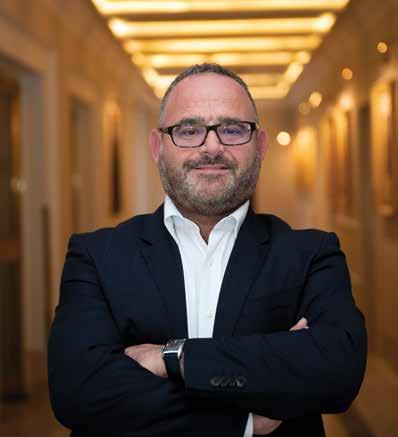
Kevin J. Borg is Director General of the Malta Employers’ Association, which brings together employers from all sectors of industry and commerce in Malta.
“Malta’s economy has expanded at a very fast pace, to the extent that we also managed to bounce back from the COVID-19 setback relatively quickly,” says Kevin, highlighting various factors that contributed to this, including a strong demand for tourism and hospitality services, as well as sustained growth in the building and construction industry, which fuels other ancillary sectors.
Sharing his views on Malta’s workforce composition, the Director General describes it as “mixed”, with foreign workers even exceeding Maltese nationals in a number of MEA-represented organisations. “This phenomenon has come about due to our


rapid economic growth, where demand for personnel exceeded the supply for both skilled and unskilled workers,” he explains, which in turn, “brought about an injection of talent and positive work ethic in some aspects, but it has also created a number of challenges both at a micro and more so at a macro level.”
Noting that the real estate and construction sectors have contributed “immensely” to the socio-economic and environmental predicament of the country, Kevin believes that the situation will require correction in the years to come. “People are growing tired of living in a permanent building site and I would like to believe that at some point, the authorities will take heed of this. Besides, better long-term planning is required because the market will not sustain ‘more of the same’ types of commercial development, most of which generates inward-looking business activity,” he affirms.
Going on to highlight the need for a better balance between growth in tourism numbers, environmental preservation, and infrastructure capacity, Kevin attests, “if we are not careful, I believe we are on course to ‘kill the proverbial goose’. Our tourism industry needs strategic
long-term planning, and employer organisations have been saying this for decades. Short-term results are being achieved to the detriment of the industry’s longterm sustainability because the current business model, based on maximisation of numbers, is negatively impacting visitors’ experience and damaging our reputation as a prime tourist destination.”
Looking ahead at the key areas for economic development, the Director General believes that Malta should aim to move up the value chain by offering a higher-quality product in sectors where we have reached saturation.
“We need to immediately but gradually alter our course. For instance, in tourism, we must refocus the industry to attract tourists with higher spending capacities and propensities. We need to achieve more with less, as we have reached a natural saturation point in many sectors where further expansion is becoming illogical,” he maintains, emphasising that any transformation must be gradual to avoid unnecessary shocks. “Careful longterm planning is essential to ensure that any corrective policies are not detrimental to people and resources.”
‘It is imperative that economic stakeholders work together towards a renewed economy which prioritises quality, innovation, trust, and improved reputation’
Maria Cauchi Delia is the Chief Executive Officer of the Malta Institute of Accountants (MIA), the only recognised professional accountancy organisation in Malta.
“Malta’s economic performance in recent years has been considerably strong, with sustained levels of growth and low rates of unemployment, surpassing our key EU competitors,” explains Maria, attributing this to a thriving services industry, including financial services, tourism, and gaming, which have delivered higherquality and better-remunerated jobs.
As the economy has expanded, however, so have disparities among the population, creating
the need for a widening of the social safety net to ensure that no one is left behind. “In parallel, despite the unprecedented infrastructural investment of the past two decades, the expansion of the economy has not always been met with the necessary strategic planning in key infrastructural services, including in the health and education sectors, which at times struggle to keep up with the demands of a modern, larger economy,” Maria affirms.
The CEO goes on to describe Malta’s workforce as diverse, with a highly educated local workforce which is increasingly backed up by EU and third-country nationals in several areas of industry. Despite this, an ageing population and skills gaps pose challenges that cannot be ignored.
“If we look at the financial services industry as an example, the success achieved in the past two decades can be undermined without appropriate investment in education, vocational and life-long learning. This needs to be backed up by an ability to attract high-quality, skilled foreign workers, to not only support industry growth but also to allow transfer of knowledge from more advanced jurisdictions,” she advises.
Sharing her views on the role of the real estate and construction sector, Maria says that there is no doubt that it has been a key driver in pushing Malta’s economic growth and employment forward. “Development has ensured that growth levels remained strong over the years, but it has also created negative side effects. These are over-development, which has, in certain areas, reduced the quality of the product offering of the Maltese Islands, and a drop in safety standards, resulting in a worrying increase in injuries and deaths,” she warns, noting that future success depends on prioritising quality and safety standards to ensure sustainable development and long-term benefits.
As for tourism, the CEO believes that the island should prioritise quality over quantity. “By focusing on high standards for sustainable practices, eco-friendly accommodations, and premium tourist experiences, the island can attract high-value visitors. This approach ensures long-term environmental protection and maintains infrastructure integrity while supporting the sector’s growth,” she says, calling for a holistic plan rather than ad hoc measures.
Sharing her forecast moving forwards, Maria reveals, “we are already seeing an increased emphasis on digital skills and green jobs, aligning with global trends.” While new sectors may be attracted to our shores, she emphasises the importance of looking at successful industries and identifying new niches within them, which can trigger further growth. “It is imperative that all economic stakeholders work together towards a renewed economy which prioritises quality, innovation, trust, and improved reputation for this to succeed.”
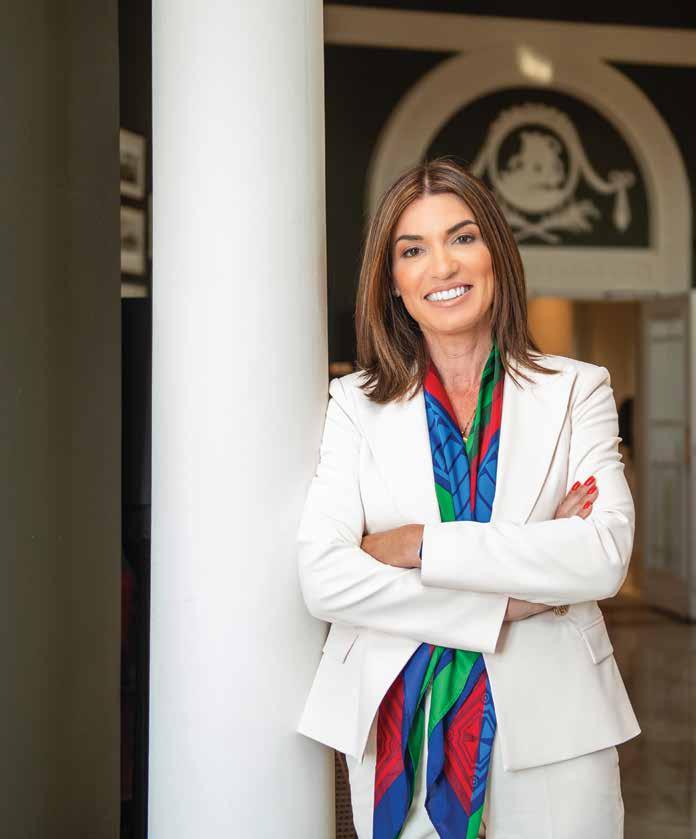
‘Malta has reached or maybe even surpassed its carrying capacity’
Tony Zahra is the President of the Malta Hotels and Restaurants Association (MHRA), the major association within Malta’s tourism sector.
“Given the very serious challenges over the last years, particularly COVID-19, Malta’s economic performance can be best described as successful,” begins Tony, underlining the main drivers for this success as the tourism industry, financial services, and manufacturing.
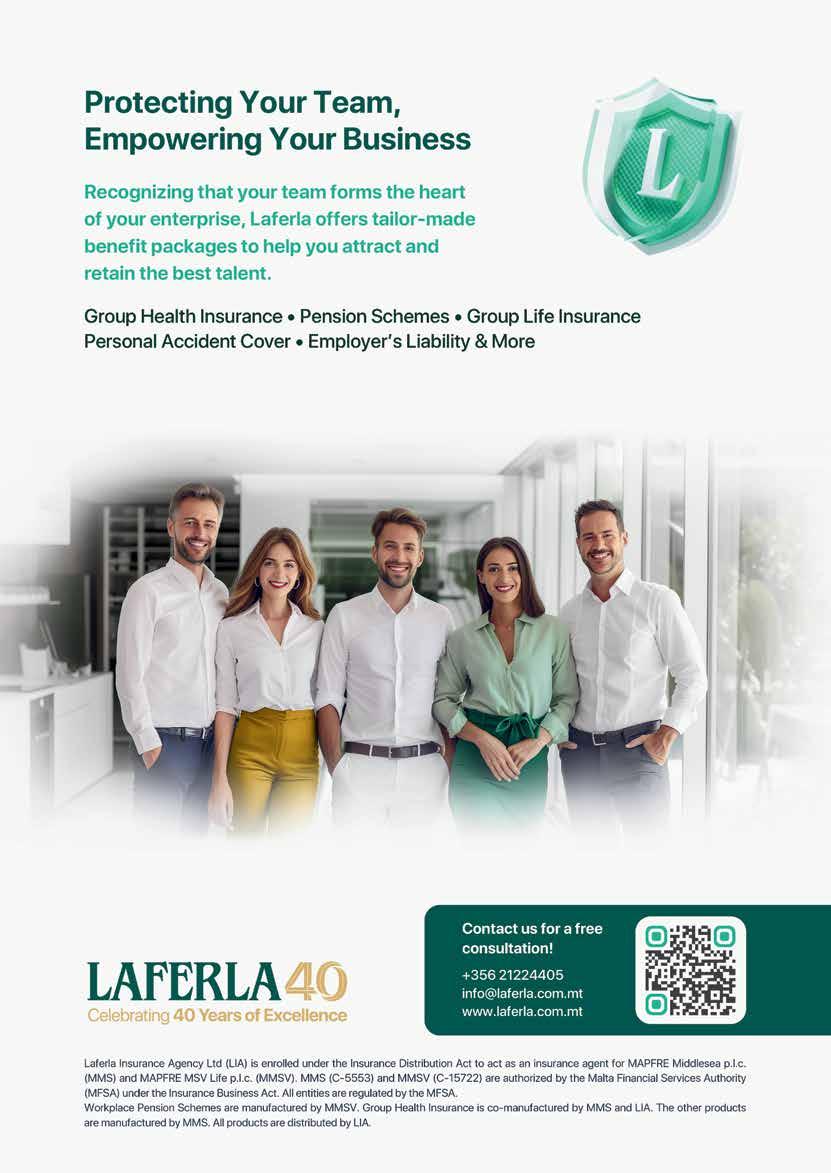

Sharing his thoughts on Malta’s current workforce composition and its impact on the economy, the MHRA President acknowledges the “massive inflow of low-skilled or semi-skilled personnel, which has had a significant impact on our GDP but has also produced a low level of productivity given that these new entrants to the market have very little or no skills.”
Affirming that “Malta has reached or maybe even surpassed its carrying capacity,” he believes that the country “now needs to ensure that new entrants to the market are highly skilled individuals or professionals that can add much more per individual to the GDP than those that were attracted over the last few years.”
Moreover, the President affirms that construction has been one of the main drivers of the economy, fuelled by the rapid increase in tourism and population growth, yet, “clearly the pace at which the industry has been working over the past years is not sustainable and we shall probably see a slowdown of activity, and maybe also a pause in price increases of real estate, if not a correction.”
With tourism setting consistent records in Malta, Tony is adamant that it cannot continue to grow in numbers, affirming, “we have reached saturation – the infrastructure and the size of the island has limitations and we have reached the limit of arrivals, but we can
get more out of each arrival provided we can change our offer, which would attract the higher-income higher-spender to Malta.” Still, he continues, “this cannot be done in one year. It has to be done over a period of years. If we don’t, our island will suffer the consequences in years to come.”
Looking ahead, Tony believes that for our island to be ready to withstand unknown shocks, we need to have a resilient economy that is built on the pillars of tourism, manufacturing, financial services, and agriculture. Acknowledging that “agriculture might sound unreal for most,” he posits, “if we are to maintain some semblance of a countryside and have some form of food security, we must have agriculture as a strategic segment. Manufacturing must reach at least 30,000 employees, and financial services need to maintain their progress.”
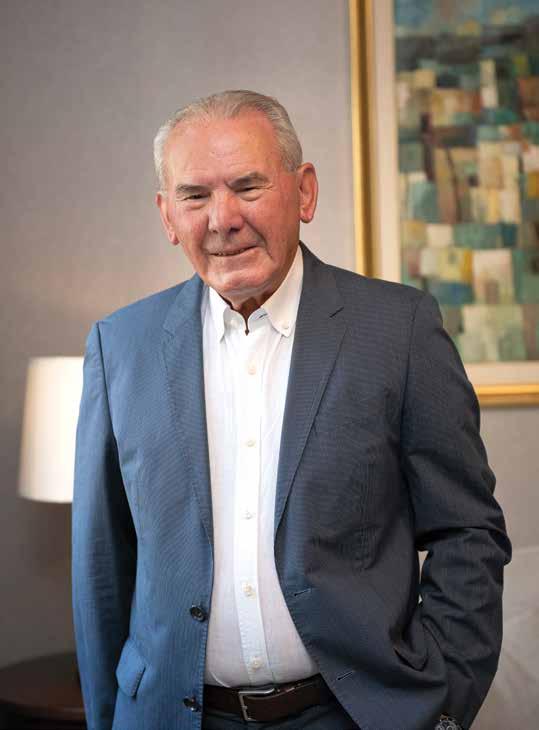
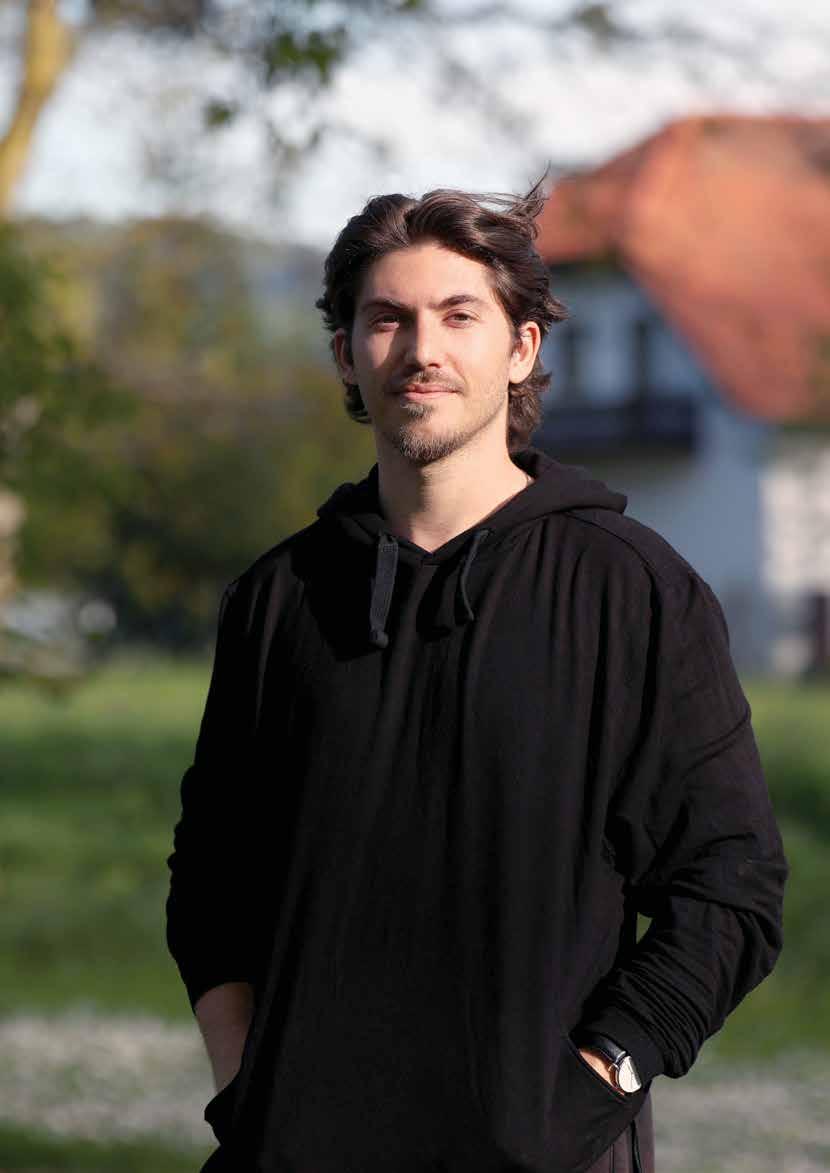
As the world moves into a new era of AI-powered technology, Web2 powered platforms – controlled by companies such as Google and Facebook – are set to be supplanted by decentralised and democratised infrastructural networks, explains Max Thake, the co-founder of peaq, a Web3 network and ecosystem launching this year. Here, he talks to Rebecca Anastasi about what the future holds.

IN 2014, GAVIN WOOD, THE FOUNDER OF THE OPEN-SOURCE BLOCKCHAIN PLATFORM ETHEREUM, HERALDED THE COMING OF A NEW AGE OF THE INTERNET – WEB3. This describes a new era where the power previously held by a few technology and social media companies, such as Google and Facebook – characteristic of the Web2 period – is shifting towards a decentralised online world. Developing in tandem with AI and machine learning, this stage is set to prioritise interconnectivity and is expected to offer alternatives to our existing economic systems.
Indeed, a Goldman Sachs report published in 2021, entitled Framing the Future of Web 3.0, explained this transformation, stating that in “framing the next wave of computing (Web 3.0), we see the potential for dramatic shifts in industry structure (decentralised, more local/niche/targeted) that could impact current investor perceptions of platform moat/strength, industry input costs, possible headwinds to monetisation driven by personalisation, and potential for shifting media and commerce trends.”
Understanding the potential of these dynamics has been central to the inception of peaq, a digital infrastructure network launching this year and positioned to serve as a backbone for decentralised applications – dApps and DePINs – to operate.
“We’re trying to bring about a new form of economy,” says Max Thake, one of peaq’s co-founders. “Our mission is to drive a global infrastructure revolution and contribute to a transition from a zero-sum financial system – in which only the very few are set to gain – to a positive-sum economy, where everyone can participate in prosperity,” he explains. On a more tangible level, this means replacing the products and services currently in use, which, for the most part are owned by centralised organisations, to “peer-to-peer decentralised alternatives,” Max says.
Elaborating, he provides an example. “Let’s take Google Maps. We take it for granted that the only way such services can work is if they are consolidated under the umbrella of a large company, typically headquartered in California. To


“We can really change the way we’re doing things. And peaq exists as the decentralised infrastructure to build these decentralised alternatives on.”
map the world, Google often sends out cars, to take images of our streets and towns. However, what we’re saying is, why not have people in those countries do it themselves and earn for it? We already have a couple of dApps – NATIX and MapMetrics –which are taking different approaches by getting users to map the streets using their phone on their dashboards or custom hardware they can buy online. In this way, you can also map the world in real time, and that information is going to be essential when it comes to other technological advancements, such as autonomous cars.”
This can be applied across other sectors, Max says. “Ride hailing, energy, telecoms, and even the provision of Wi-Fi – we can replace the big corporations with people on the ground offering their own connectivity. We can really change the way we’re doing things. And peaq exists as the decentralised infrastructure to build these decentralised alternatives on,” he continues, adding that, by also using peaq as a standard, DePINs can build connections between themselves.
“We already have more than 40 dApps, operating in 18 different industries on peaq, and we haven’t even launched yet. And we see the way they can positively work together.” These dApps and DePINs range in scope and function, covering myriad services from air-quality monitoring and virtual power plants to peer-topeer electric vehicle charging and tokenised autonomous robocafés.
This will contribute to the strengthening of a more circular economy, the co-founder continues, saying that he sees the network as becoming “the binding glue between a highly advanced technological future and a return to nature. One of the fundamental principles of the future we’re building together is that it will be contributing to this idea of a regenerative, shared economy, and so there will be a lot less waste.”
This can be observed through the micro-details of how dApps on peaq have the potential to work, he continues: “You can have, for example, energy dApps which harness power from solar panels on top of your home; you can then use that energy in your electric vehicle charging station, and use other dApps on the platform to ride-share with others in the community; overall, you’re increasing efficiency and reducing the number of cars on the street. Everything is plugged into each other, making the economy more dynamic and – crucially – anyone can earn from all of this and have a say in how the dApps are governed and grown,” he explains.
“We’ve already attracted over one million devices to our network, and that’s set to grow. We’re hoping to be the most adopted blockchain at launch.”
That this vision is an attractive proposition is clear from the recognition peaq has been accruing, with the entire network recently achieving a staggering €333,333,333 million valuation, and its token raising €20 million on CoinList and €15 million in a funding round in May. Moreover, a report commissioned by peaq to evaluate the platform’s projected impact between 2024 and 2027 asserts that the next few years will see $1.81 billion total impact value generated by the network.
“It’s extremely intense, especially at the stage we’re at now, where we’re growing and scaling up,” Max attests. “However, there is a lot of positive motivation, and many opportunities on the table, so it’s a case of prioritising and developing them. It’s difficult to satisfy them all, but we focus on optimising our dayto-day routine to remain at a high level of operations for these long, intense periods,” the co-founder says.
To this end, peaq – through its main contributing company and team at EOT Labs, which was established in 2018 –engages a steadily-expanding team of approximately 40 professionals, all working remotely. The three co-founders – Max, who mainly focuses on operations, communications and business development; Till Wender, who overseas finance and fundraising; as well as Leonard Dorlöchter, who is responsible for peaq’s tech, product and ecosystem – have been working together since 2017, having first embarked on a four-year research and development process.
“During that time, we tried and tested many things, and we emerged understanding what did and didn’t work. There were some tough lessons, but those years put us in a strong position.” Today, peaq also boasts a wider community of over 200,000 people, with 40 ambassadors, all “pushing peaq forward”.
Looking ahead, the team is focused on inaugurating the network and welcoming its first active users. “I’m excited to see those adoption statistics once they come out. We’ve already attracted over one million devices to our network, and that’s set to grow. We’re hoping to be the most adopted blockchain at launch,” he explains.
On a personal basis, Max feels “privileged to be part of creating the future and meeting fantastic minds – people who are shaping different industries. Every day presents a new challenge,” he says, and this gives him the opportunity to be creative.
So, what advice would he have for someone just starting out in their entrepreneurial career, and motivated to follow in his footsteps? “There is no rule book, and you need to adapt to the moment, especially at the beginning. The things which you think are going to be the toughest likely will be those which don’t turn out to be, but be prepared for the unexpected. You’ve got to be nimble,” he smiles.




PHOTO BY BERNARD POLIDANO

Sarah Muscat Azzopardi picks the brains of prominent Maltese podcasters
Melanie Kelly, Peter Grech, and Trudy Kerr about the surging popularity of podcasts in Malta, discovering firsthand perspectives on the trends shaping the local podcasting scene.
IN RECENT YEARS, MALTA HAS WITNESSED A REMARKABLE SURGE IN PODCAST PRODUCTION AND LISTENERSHIP, MIRRORING GLOBAL TRENDS, YET WITH A DISTINCTLY LOCAL FLAVOUR. From current affairs and cultural discussions to comedy and personal development, Maltese podcasts are diverse and rapidly growing in both number and popularity. This burgeoning medium is not only reshaping how Maltese people consume content, but also providing a platform for voices that might otherwise go unheard.
Presenter and DJ Trudy Kerr has hosted a variety of podcasts but is best known for ‘The SHE Word –Conversations women rarely have, but really should’. Having started her media career in 2013 as a radio DJ and TV presenter/producer on One, her voice is certainly not a new one, and many are familiar with her work as a drive time radio DJ on XFM, alongside presenting events and interviewing.
Her journey into podcasting, however, is more recent: “When COVID hit and the radio station had to close, I moved across to the podcast platform. I was fortunate to be on the platform at the start of podcasting’s popularity in Malta and have watched the channel grow. Some shows do very well and will continue to do so, while others have come and gone,” she shares.


“The evolution of mobile media has naturally been the decline of more traditional channels, and podcasting has been a platform to really benefit from this.”
Trudy Kerr, Host, The SHE Word
Trudy goes on to reveal that her podcast, The SHE Word, emerged from an interview on The Interviewer – another channel in which she interviewed Maxine Attard, who shared her account of a recent miscarriage. “The response was overwhelming, and it became apparent that there was a serious need for conversations about the topics that affect women, but aren’t addressed on mainstream platforms,” she shares.
Similarly, for Melanie Kelly, presenter of Maltese language podcast ‘Kellymni – Il-Podcast ta’ Gwida’, it was also a love of radio that drew her to podcasting. “My three-year stint on XFM with discussion show ‘Let’s Talk About Sex’ which I used to video
record and upload was like the first podcast-style show on social media, so when Content House, the owners of Gwida, approached me with the idea of a podcast, I immediately said yes,” she explains.
Gwida.mt is Malta’s most popular portal in the entertainment and lifestyle segment in Malta, with a social media reach of over one million people every week. Riding on the popularity of Gwida.mt, an average Kellymni podcast reaches over 100,000 viewers per show, with some podcasts attracting as many as 200,000 viewers per programme. Gwida was originally owned by the state television when the Gwida magazine, a popular weekly publication in Malta, was first launched in 1961. The brand – among Malta’s best-known media brands – has since become an integral part of Maltese popular culture, offering a mix of entertainment, celebrity news, and television programming. It was later bought by Content House, one of Malta’s leading media companies, with the objective to exploit the popularity of the brand online. The company first launched Gwida.mt in 2019, and in 2023 launched Kellymni, the first video podcast in this genre. Both digital platforms became an instant hit, attracting mass following on social media. Kellymni has also managed to attract significant advertising and sponsorship interest from leading commercial brands, as its large audience is certainly proving to be a draw.
Melanie Kelly always thought Kellymni would be a hit, but has been left impressed by the significant following it has amassed: “Since Kellymni started, I feel that it has matured, gaining a lot of interest and increasing in popularity,” Melanie continues, describing the show as a “very intimate one-toone interview-style podcast where I delve deeper into my guests and explore stories, topics and feelings which they have never really divulged. This shows personalities’ human side, and creates a community vibe with listeners, who feel they are part of the show.”
Peter-Jan Grech, meanwhile, is the host of ‘Unbrandme’, the BRND WGN podcast where he unpacks the stories of brand owners, entrepreneurs and disruptors to understand how their life stories and lessons have impacted the brands and businesses they build and lead. As an avid podcast listener, he admits, “I never imagined myself hosting one before my colleagues suggested it.” Despite this, having spent much of his professional life in discovery workshops, working with entrepreneurs to understand what sets their brand apart, Peter says the transition to the format was surprisingly
natural. “The podcast is still in its infancy so we’re still learning, however, besides a few tweaks, we’re trying to be as consistent as possible despite the temptation to change.”
Sharing his motivation behind the podcast, he continues, “years working with so many great clients at BRND WGN has fuelled our belief that better people make better brands, and better brands make a better world. So, we search for these better people, to see what sets them apart and what makes them uncommon, uncovering the stories behind their foundation, their successes and failures, and the lessons they learnt along the way,” adding that the feedback has been extremely positive.
Commenting on how the Maltese podcasting landscape has evolved, Peter believes that the format is getting more and more popular, and “it seems like there’s a newcomer every week.” In his view, the local podcast scene allows creators to serve localised content to new niches like never before – niches which were previously underserved. “The format also allows more freedom to producers to deliver content that is not dependent on mainstream networks or ad revenue but is more in touch with listeners directly,” he maintains.
Trudy agrees, affirming that podcasting is relatively easy to create and bypasses a great deal of the restrictions of mainstream media. “The evolution of mobile media has naturally been the decline of more traditional channels, and podcasting has been a platform to really benefit from this. A podcast can be viewed or listened to anywhere at any time,” she says.
As for the topics and formats that resonate most with Maltese listeners, Trudy believes that Maltese content in the Maltese language will always be popular with locals. Apart from being valuable and significant, she points out, “by its very nature, it also bypasses a significant number of censorship restrictions due to the language.” Admitting that she is occasionally asked why ‘The SHE Word’ is not in Maltese, Trudy smiles, “I have two answers to that – first, because my Maltese isn’t the best and the show would take at least five hours to film; and second, because the issues discussed affect women all over the world and the English language gives the show a far greater reach. But I would love to see a continued growth in Maltese language content.”
This plays to Melanie’s strengths, who believes that “Maltese people enjoy podcasts such as ‘Kellymni’ because they appreciate getting to know personalities they see frequently on a deeper level. I suppose others also enjoy lighthearted podcasts that shock with the language and profanity used.”
“I’m excited about how the future will unfold. I think we’re still only seeing a very embryonic landscape and there’s bound to be some exciting opportunities ahead.”
Peter-Jan Grech, Host, Unbrandme
For Peter, it’s not necessarily about success in numbers but rather, about really conquering a niche. “Similar to global trends, the shows that host guests also benefit from the advantage of tapping into the guests’ own popularity and network, making them more successful,” he adds, noting that apart from this, most audiences are looking for learnings, insights and entertainment. “If producers are able to deliver at least one of those consistently yet in a unique way, there’s a clear path to success.”
Still, despite podcasting’s growing popularity and clear benefits, that’s not to say the medium doesn’t have its own set of challenges. “Running a professional podcast takes a huge investment to
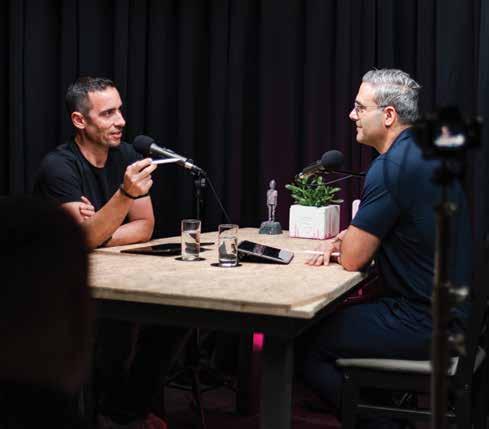



consistently deliver high-quality episodes from an audio and visual standpoint, but also a big investment in talent and hours for research, editing and networking,” Peter explains, stating that, without the team behind ‘Unbrandme’, the show wouldn’t run.
“Monetising the podcast solely on listeners is a pipe dream and we have resisted accepting advertising content for now to stay independent,” he continues, noting that the small local audience size poses a challenge to any producer to commercialise niche local podcasts to the extent of becoming a full-time job.
For Trudy, creating a successful podcast channel is far more than turning up with a camera and a hot topic. “It is easy to forget that local productions sit on a global platform and therefore are still competing for our attention against the best in the world. Therefore, there are three areas that should be seriously considered before embarking on a podcast,” she maintains, listing production quality, original and engaging content, and the right host, who has to be natural and confident in front of a camera or mic.
The growth of podcasting has also impacted traditional media consumption in Malta, which in turn also reflects changes in the island’s demographic. “Malta itself is changing,” says Trudy, pointing out that the island looks very different to when she first arrived, 18 years ago. “Today, one in four of the population are foreigners and most likely do not speak Maltese, and unless local media embraces and accounts for this demographic, the trend of growth for online media will continue, as it has done over the past years. That said, the ideal platform integrates local culture with an awareness of the Malta we live in today.”
In Melanie’s opinion, online content and podcasts are the way forward. “Television will always be television, however online is slowly taking over, which makes sense since in our fast-paced life, we do not always sit in front of a TV at a scheduled hour but can spare some free time to enjoy a show in our own time,” she says. Looking to the future, the presenter adds, “online shows are on the rise and we shall see quite a few popping up in the near future. With regard to my podcast, I hope the viewers will continue enjoying them as much as I do.”
Certainly, Trudy believes that some podcasts have the longevity to continue, whilst others will live out their lifespan and retire. “We are aiming to continue having ‘Conversations Women Rarely Have, But Really Should’ until we run out of things for women to talk about, so I don’t think we will run out of topics any time soon,” she smiles.
As for Peter, looking ahead, he says, “I’m excited about how the future will unfold. I think we’re still only seeing a very embryonic landscape and there’s bound to be some exciting opportunities ahead. I also believe the major local platforms will be forced to enter this space as an opportunity to reach into new audience groups, specifically Gen Z and Gen Alpha.”
“Online shows are on the rise and we shall see quite a few popping up in the near future.”
Melanie Kelly, Host, Kellymni
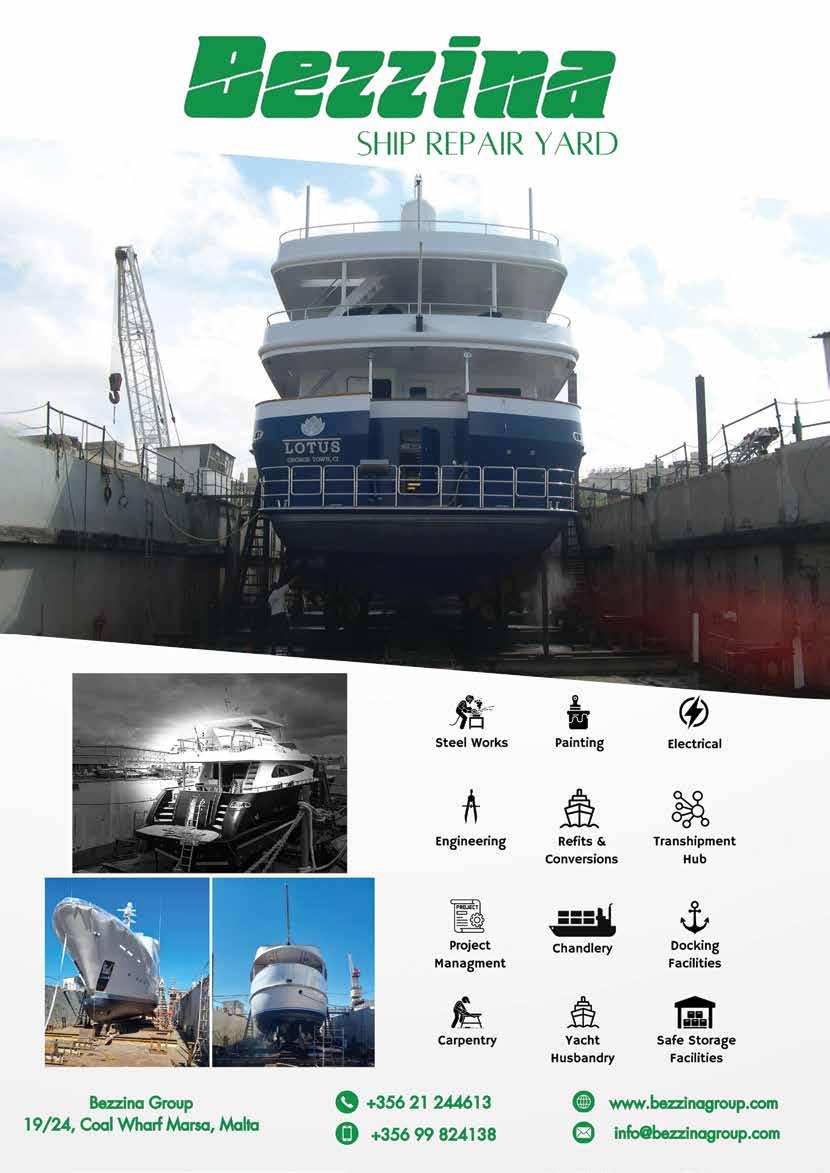
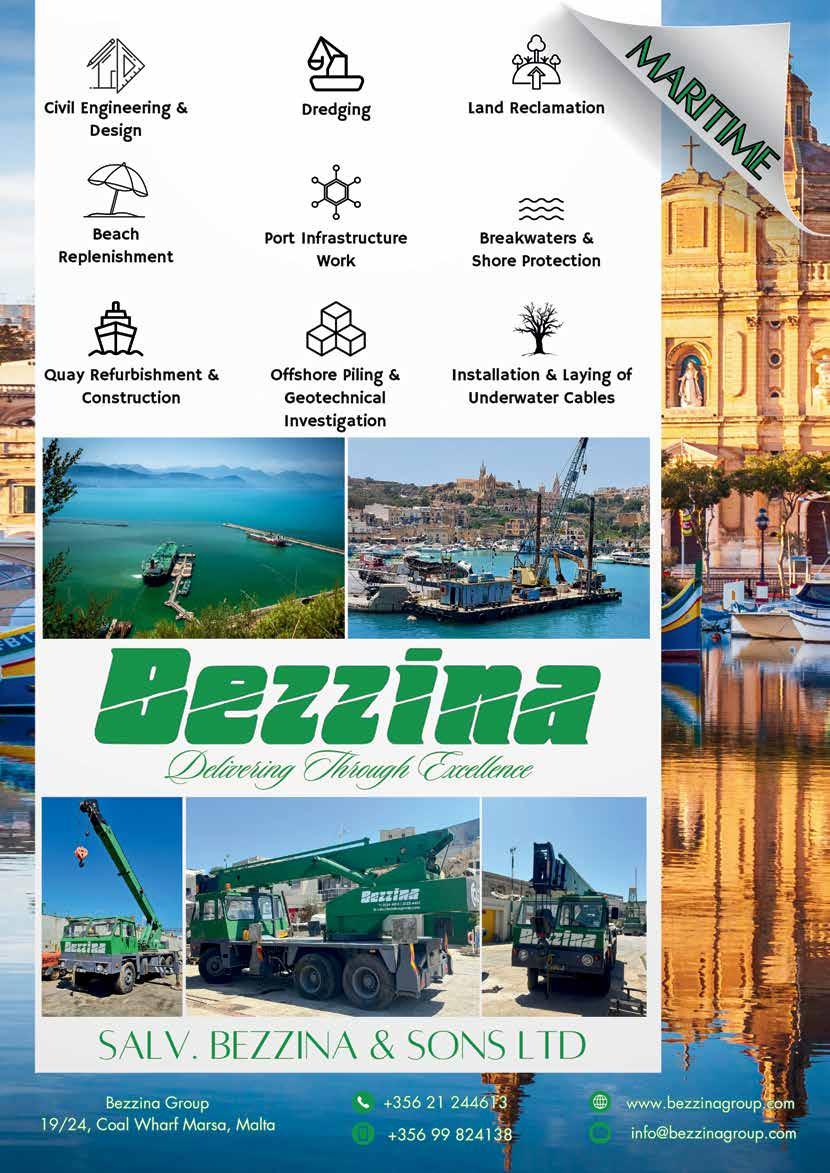

As Malta’s population continues to age, and state pensions become less likely to provide solid support, private retirement plans are stepping in to fill the gaps. Alex Bezzina, Head of Insurance Services and Pensions at Bank of Valletta speaks to Rebecca Anastasi to explain the diversity and flexibility of the pension plans on offer, which provide some peace of mind for the future.
However, with ageing populations on the rise across the globe, and reserves dropping due to the decrease in contributions –as birth rates decrease – the increasing number of beneficiaries is likely to put pressure on state coffers, making it difficult for governments to provide a decent and dignified living to their retirees. Yet, as Alex Bezzina, affirms, private pension plans are poised to assist.
“Our goal is to cater for all customers at every point of their life cycle,” says Mr Bezzina, who boasts over two decades of investment advisory experience. “And, as a result, we’re driven to offer market-leading pension plan products – as intermediaries of MAPFRE MSV Life – which are founded on an extensive selection of possible underlying investments,” he continues. These, he asserts, are available to individuals between the ages of 18 and 59 seeking personal solutions, or employers keen to offer added benefits to their staff.
The bank’s offering has a long history, going back to 1994, when the institution, through its long-standing relationship with MAPFRE – then known as Middlesea Valletta Life – started to furnish savings plans which provided capital protection on death or maturity. “These products were designed as savings plans – whether with a specific goal in mind or simply for retirement
planning – so the issues surrounding pensions and sustainability have long been a priority here at Bank of Valletta,” he explains.
In 2015, the Government of Malta introduced the Retirement Pensions Act, regulating the provision of private retirement plans on the island, with amendments passed in 2018. It was a gamechanger which boosted the attractiveness of the schemes, Mr Bezzina says.
“Our traditional savings plans had already evolved to include more options, allowing clients to select the underlying investments. MAPFRE MSV Life had also launched a retirement scheme by this time. However, when the new law was passed, it spurred individuals to think more seriously about their future.” This was due to the legislation’s ratification of improved terms, which became the catalyst for increased tax rebates offered exclusively to Malta’s tax residents. These rebates have now risen from 15 per cent to 25 per cent on the first €3,000 of their annual premium, allowing investors to receive up to €750 back on that premium.
“Our goal is to cater for all customers at every point of their life cycle.”

“Long-term investments should ideally start with equity exposure.”
“This last increase occurred a few years back and offers an added advantage: while a client is receiving the rebate, the policy account still registers the full €3,000. This could be interpreted to result in an automatic 33 per cent gain. Notably, this demonstrates Government’s commitment to making these plans more attractive. Fundamentally, our public pension framework is unsustainable in the long-term. However, individuals and businesses can now benefit from financial incentives on private retirement plans for themselves or their employees,” Mr Bezzina continues.
Indeed, Bank of Valletta is actively communicating with its corporate customers to underscore the benefits of these
plans. “In this regard, Bank of Valletta offers MAPFRE MSV Life’s Second Pillar Voluntary Occupational Pension Scheme, the WorkSave Pension Plan, where contributions made on behalf of an employee are tax deductible up to €2,000 per employee, per year. On top of this, both the employer as well as the employee receive a 25 per cent tax rebate on an annual premium or contribution, which is capped at €3,000 each. Additionally, this offering aids in staff retention – if an individual has both a personal plan and one through their employer, they will receive the 25 per cent tax rebate on both schemes,” Mr Bezzina attests.
Elaborating further, Mr Bezzina explains that, through MAPFRE MSV Life, the bank offers two “unique” propositions. “Our clients can either opt for a ‘With Profits Pension Plan’, where investments are made in a conservative manner, with the capital value protected until death or maturity. This occurs in agreement with the customer and in line with current legislation; moreover, after withdrawing the 30 per cent tax-free lump sum, and retaining the remaining 70 per cent of the proceeds, the

“Building your investment framework doesn’t need to be a complex process.”
customer will have the option to purchase a Life Annuity, or to make use of Programmed Withdrawals. While the returns can be deemed to be of a more conservative nature, the plan is considered as low-risk. Our second option is the ‘Unit-Linked Pension Plan’, which offers the potential for higher returns over the longer term. In this case, the client is able to choose the level of risk desired through a wide range of funds, categorised into bonds, equity, portfolio, and target funds,” he explains.
This is what distinguishes Bank of Valletta’s offerring through MAPFRE MSV Life from other similar schemes: their diversity and flexibility. “Ultimately, the opportunities are substantial, allowing our clients to choose where to allocate their investments based on their priorities and values. This positions us ahead of the market. For example, customers with ESG (Environmental, Social, and Governance) principles can invest in funds through the ‘Unit-Linked Pension Plan’ which prioritise such values. We offer funds classified under both Article 8 and the more demanding Article 9 of the Sustainable Finance Disclosure Regulation (SDFR), ensuring that we uphold the highest standards. This aligns with the bank’s strategy to provide a distinct variety of options tailored to everyone’s needs,” Mr Bezzina shares.
The returns accrued until retirement depend partly on the duration of the investment as well as on the amount of the premium paid, the Head of Insurance Services and Pensions says. This is particularly true for a Unit-Linked Pension Plan. “Typically, the premium is capped at €3,000 per person due to the tax rebate. Therefore, what varies is the number of years invested, with compounding growth likely to be exponentially substantial depending on the choices made,” he states.
Traditionally, the more volatile the investment, the better the expected long-term returns. For instance, if you invest in a fund through the ‘Unit-Linked Pension Plan’ and its value drops at the beginning of the plan, your monthly investment will buy more units. Over time, these units are likely to increase in value, although past performance is not a reliable indicator of current or future results. Therefore, if you’re planning on taking out a plan for the next 20 to 25 years, it would be ideal to focus on equity related investments for the first 10 years. After that, one should ideally start a derisking process by shifting investments to, for example, a target fund which becomes more conservative as the years progress,” he explains.
In other words, he adds, “regular long-term investments should ideally start with equity exposure, and it’s advisable to take risks at the beginning of such a policy since you’re still in the accumulation phase.” However, if circumstances change and the client decides to switch to a more cautious plan, this is also possible as flexibility is built into the offering. “In such cases, there are various solutions where the customer could opt for more or less volatility, depending on their specific expectations. In this case, one can switch holdings and/or re-direct future premia.”
Fundamentally, Mr Bezzina adds, these investments should form part of a comprehensive portfolio, structured to maximise the potential for return and provide peace of mind for the future. “The bank works closely with our clients through our investment centres and private banking facilities, meeting with a financial advisor to determine what best suits their needs. Building your investment framework doesn’t need to be a complex process,” he says. This support is available throughout the lifetime of any plan, with guidance tailored to the client’s objectives.
Looking ahead, any changes to the bank’s and MAPFRE MSV Life’s offerings will depend on “legislation that continues to evolve as the Government makes retirement plans more attractive in the long term,” Mr Bezzina notes. He concludes by affirming that the bank’s commitment to meeting its clients’ diverse needs will remain unwavering.
Further information on the MAPFRE MSV Life Personal Pension Plan may be obtained from the Key Features Document available from our website www.bov.com. If you stop paying your plan before the selected retirement date, you may not get back as much as you invested. If you invest in this product, you will not have access to your money before the retirement date. The value of your investment may go down as well as up and you may get back less than you originally invested. Tax treatment depends on the individual circumstances. Tax legislation and the amount of rebate may change in the future. Changes in the rate of exchange of currencies may also affect the value of investments.
Past performance is not a reliable indicator of current or future results. The Product is manufactured by MAPFRE MSV Life p.l.c. and distributed by Bank of Valletta p.l.c. This advert is issued by Bank of Valletta p.l.c., 58, Triq San Żakkarija, Il-Belt Valletta VLT 1130. Bank of Valletta p.l.c. is an enrolled Tied Insurance Intermediary under the Insurance Distribution Act, Cap. 487 of the Laws of Malta for MAPFRE MSV Life p.l.c.
(MMSV). MMSV (C-15722) is authorised under the Insurance Business Act, Cap. 403 of the Laws of Malta. Both entities are regulated by the Malta Financial Services Authority.

Since its establishment over 50 years ago, Malta Enterprise – initially operating as the Malta Development Corporation – has expanded its role in tandem with the growth of the Maltese economy. Here, Chairman William Wait speaks to Rebecca Anastasi to outline his vision for the entity’s future, while underscoring its strategic goals in consolidating the country’s industrial and commercial successes.
“MALTA’S
William Wait, the Chairman of Malta Enterprise asserts, as he looks ahead to the transformations the country is set to experience. Indeed, he singles out “sectors such as digital technology, life sciences, and green industries” as areas of growth.
In such a context, he says, “our role will involve not just attracting foreign direct investment (FDI) but also fostering local innovation and entrepreneurship. This will require a more proactive approach in policy advocacy, whilst ensuring that the regulatory environment supports the growth of these new sectors.”
Malta Enterprise was established in 1967, as the Malta Development Corporation (MDC), with the express aim of “laying the foundations for Malta’s industrial sector”; at the time, this involved “attracting FDI and supporting the establishment of manufacturing industries that could generate employment and drive economic growth.” As the country’s economy diversified, however, the organisation evolved in tandem. “By 2004, the MDC was transformed into Malta Enterprise, expanding our mandate to not only continue attracting FDI but also to support local enterprises, foster innovation, and promote export-oriented growth,” Mr Wait explains.
Today, “Malta Enterprise acts as a central pillar in Malta’s economic development, providing a wide range of services including investment incentives, advisory services, and support for start-ups and innovative industries.” Yet, the entity is constantly reinventing itself and, one of the most significant shifts it has undergone
in recent years is to increase its focus on “developing niche sectors, such as life sciences, digital games, bioinformatics, as well as the important work which we have been doing in the semiconductor industry.”
This is in line with its goals of positioning “Malta as a hub for cutting-edge industries, leveraging our unique strengths, which include a highly skilled workforce and our strategic geographic location.” Moreover, Malta Enterprise’s aims require a consolidation of its involvement “in shaping national economic policy by maintaining close relationships with both Government entities and private sector stakeholders,” the Chairman asserts.
And further change is afoot. “Looking ahead, our focus is on ensuring that Malta remains competitive in the global market. This involves continuously adapting to new economic realities, such as the growing importance of Asian markets and the need for sustainable investment. We aim to create a business environment that not only attracts investment but also fosters long-term growth and innovation, ensuring that Malta continues to thrive as a dynamic and resilient economy,” he attests.
Elaborating, Mr Wait states that “with the global emphasis on sustainability, Malta Enterprise will likely expand its efforts in promoting and supporting green investments.” Internationally, Malta is, in fact, expected to increase its engagement in promoting green technologies. “With the European Union’s drive towards a green transition, Malta is likely to enhance its focus on renewable energy, green infrastructure, and environmentally friendly business practices. This evolution will be crucial for Malta to meet both EU standards and global expectations, ensuring
“Looking ahead, our focus is on ensuring that Malta remains competitive in the global market.”
long-term economic resilience.” To facilitate, Malta Enterprise offers more targeted incentives for businesses adopting sustainable practices and technologies,” with the entity providing “guidance which can reduce costs and improve competitiveness,” he continues.
Economic strength will continue to be built, he insists, on a foundation of digitisation. “As the digital economy becomes increasingly central to Malta’s growth, Malta Enterprise will need to intensify its support for digital transformation across all sectors. This includes not only supporting the growth of ICT companies but also helping traditional industries adopt digital technologies,” the Chairman explains.
This approach is cognisant of the way in which the digital economy will “continue to be a significant driver of growth,” Mr Wait maintains. Malta, he explains, has “already positioned itself as an attractive destination for digital nomads and remote businesses due to its advanced ICT infrastructure
and favourable regulatory environment. This trend is likely to continue, with further investments in digital infrastructure and incentives for tech companies to establish and expand their operations on the island.”
To this end, Malta Enterprise will likely broaden its role in “providing resources, training, and financial support to ensure that businesses of all sizes can leverage digital tools to enhance their productivity and global reach.”
This also presents “a wealth of opportunities” for Maltese businesses, “especially in sectors like fintech, cybersecurity, and digital games development,” he continues. “With the increasing demand for innovative digital solutions, Malta can position itself as a leader in these areas. Malta Enterprise plans to support this by offering targeted incentives for companies investing in digital transformation, as well as fostering partnerships between local firms and international tech giants through events such as the Start Up Festival,” Mr Wait promises.
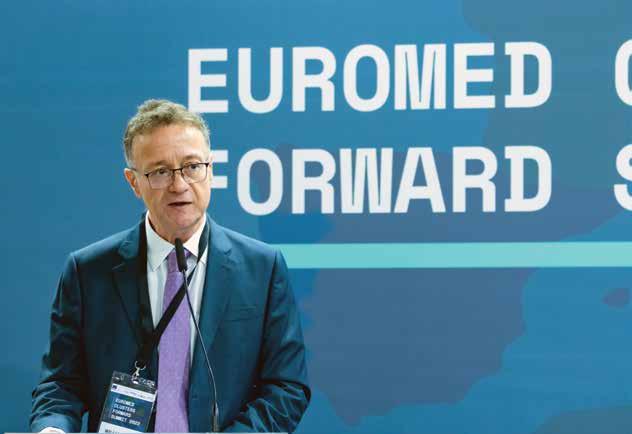


The challenges and opportunities open to SMEs are integral considerations to this approach: “At Malta Enterprise we recognise that SMEs are the backbone of Malta’s economy, driving innovation, job creation, and economic resilience.
Supporting SMEs is therefore a critical priority for us. We have developed a comprehensive approach to ensure that these companies receive the tailored support they need to thrive.”
In fact, the organisation offers “a wide range of financial incentives specifically designed for SMEs,” including the Business Development and Micro Invest Schemes, as well as the Smart and Sustainable Investment Grant. More support is further targeted to smaller companies through the initiative Start in Malta, which “provides a comprehensive package that includes incubation services, networking opportunities, and access to funding. By creating a nurturing environment for start-ups, we aim to foster a culture of entrepreneurship and innovation that benefits the wider SME community,” Mr Wait continues.
Looking ahead, the Chairman is resolved to continue guiding the entity in productive directions. “My role is multifaceted and involves steering the organisation towards achieving its strategic goals while ensuring that it remains aligned with Malta’s broader economic objectives,” he explains. “This requires a balance of strategic foresight, effective governance, and strong advocacy to ensure that we continue to create value for the country and its people.”
“At Malta Enterprise we recognise that SMEs are the backbone of Malta’s economy.”
He emphasises that the true strength of Malta Enterprise lies in its collaborative approach, where each team member brings a unique skill set to the table, enabling the organisation to remain agile in a rapidly changing global environment. “Innovation and adaptability are at the core of what we do,” he adds, explaining how these qualities allow them to not only respond to emerging challenges but also seize new opportunities as they arise. As the organisation looks ahead, he expresses confidence that their continued focus on fostering sustainable growth, attracting investment, and nurturing talent will cement Malta’s position as a competitive hub in the international market, driving prosperity for the nation.
Yet, he insists, all of this would not be possible without the sterling work of the team around him, whose nimble abilities underscore the entity’s strategy. This is crucial, he says, concluding, since the dynamic evolution in Malta Enterprise’s role “continues to show our commitment to not just keeping pace with global trends but also to proactively shaping the future of Malta’s economy for the benefit of all stakeholders involved.”

PHOTO BY INIGO TAYLOR
For almost five decades, AX Group has been synonymous with ambitious hospitality and development projects moulded by the firm’s core values: creativity, integrity, and determination. Here, Rebecca Anastasi meets its Chairman and Founder, Angelo Xuereb, as well as Claire Zammit Xuereb, Director of Hospitality and Care, and Denise Xuereb, Director of Construction and Development and CEO of AX Real Estate plc, who recall the Group’s evolution as it stands poised to celebrate its 50th anniversary in 2025, while also looking ahead to a future founded on family values.

WHEN ANGELO XUEREB, THE CHAIRMAN AND FOUNDER OF HOSPITALITY AND CONSTRUCTION FIRM, AX GROUP, WAS JUST 13 YEARS OLD, a friend of his father asked him what he wanted to be when he grew up. A simple enough question, but Angelo was shy and, as the eldest boy of 11 siblings growing up in a farming family, he had always felt the weight of his father’s expectations. “A businessman”, he had answered, much to the gaping mouths before him. His father didn’t approve.
Angelo spent the next few years driven to change his father’s mind. “At 16, I wanted to get into the construction industry, but my father insisted: no. He was probably worried since I had always been so shy, and, perhaps, he also underestimated me. At 22, I got married, and thought, ‘this is my chance’. Although I didn’t have his support, I was determined to prove to my father and to myself that I could make a success of myself,” Angelo recalls. So, he sold his car and used the money the young couple had received as wedding gifts to open a one-man show in 1975: Angelo Xuereb Limited.
“At first, I was doing very modest work as a small contractor, such as fixing pavements. I was on my own and nobody knew me – people knew my father in the village but beyond that, I was anonymous. I started to apply for public tenders,
and I was extremely eager. I couldn’t fail, so I was working like mad, at all times of the day and at the weekends to finish any contracts I received,” he explains, describing his enduring passion for his work, and particularly for design – for “picking up a pencil, a ruler and a piece of paper, and making some plans.”
One day, as he was overseeing the completion of work on a boundary wall for a factory which had yet to be built, he was called in for a meeting with the Minister for Works at the time. “I was still wearing my dusty construction clothes; he asked me my name and gave me the responsibility to build one block of the factory. Apparently, the developer who had received the contract was reneging on his deadlines, and they needed to see progress.”
“The growth of the company was exponential at the time, and I moved from construction to development to tourism, investing in some key locations.”
Angelo Xuereb, Chairman and Founder
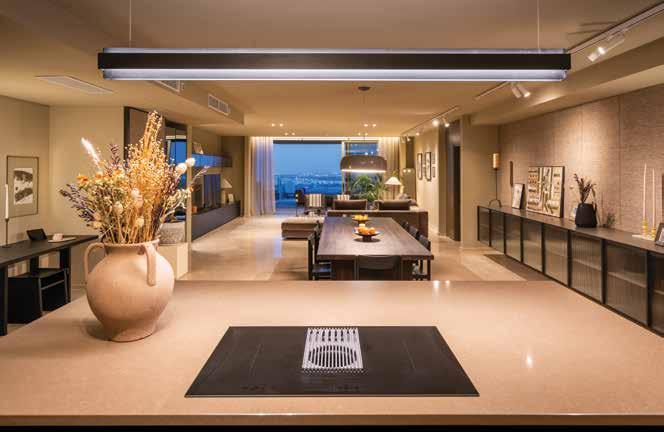
Angelo delivered, and, by 1978, just three years after first opening his company, he inaugurated his own manufacturing plant making precast and prestressed concrete slabs – the only one on the island. Success followed swiftly, with the factory growing in stature and reputation. In 1982, after accruing substantial deposits, Angelo made the move to diversify. “The growth of the company was exponential at the time, and I moved from construction to development to tourism, investing in some key locations,” Angelo says.
Central to his success was his ability to pivot. Angelo recalls having started to build what would later become the Sunny Coast, and being asked by a tour operator: “What would it cost if you had to reconstruct this by the sea?” The operator explained they’d be able to charge a higher room rate. Angelo halted works and shifted the site to a same-sized plot further down the road – right on the coast.
Later, another operator, this time Dutch, asked Angelo if he had ever considered developing a pool there. “If you have a pool by this summer, I’ll sign a contract with you,” he’d said. It was already April,
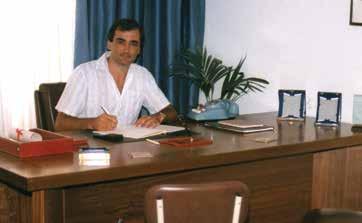
but, just three months later, the Sunny Coast opened – boasting a pool just a stone’s throw away from the sparkling Mediterranean Sea.
“I remember those days, and earlier, when my father was still a oneman-band, and our house was filled with company business,” smiles Angelo’s eldest daughter, Claire Zammit Xuereb, who is today AX Group’s Director of Hospitality and Care. Claire grew up in the family firm – as a child, she was always giving a helping hand, and at 16, she started working in the business officially, mainly within the Suncrest Hotel, which was inaugurated in 1987. At the time, it was the largest hotel on the Maltese Islands.
“The growth of the company really began when he started delegating responsibilities to different people he trusted and started to diversify,” she recounts. While the intention was always to move into a more senior role in the family business, in her early days, Claire felt the need to boost her skills and credentials. “I felt I needed to learn, and to learn from the best.”
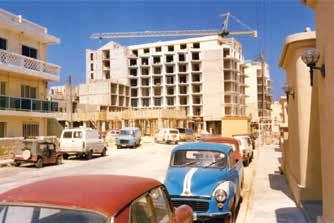


To this end, Claire moved to Switzerland to complete her education in hospitality management. She came back home in 2001. By this time, the family firm had expanded significantly, to include The Victoria Hotel and Palazzo Capua, as well as the provision of healthcare services, with the Capua Hospital (today St James Hospital) in Sliema inaugurated in 1996. In 1999, the firm became publicly listed through Suncrest plc. “Upon my return, I directed my attention to Suncrest, where I had spent much of my childhood. I established a department called Revenue Management, and at the age of 24, I transitioned to work on The Victoria Hotel in Sliema, where I successfully quadruped profits within a year.”
Her younger sister, Denise – nine years Claire’s junior – was soon to join the team. “I started by doing the jobs my elder sister told me to do,” Denise laughs, adding that she initially took on animation, housekeeping, F&B, and guest relations duties. She later moved to The Victoria Hotel, where she worked in the events team, and then, in the early 2000s, became part of The Palace Hotel’s pre-opening team.
“In the Group, every business we operate is independent and self-sufficient, and every element must be sustainable – this approach runs throughout the entire firm.”
Denise Xuereb, Director of Construction and Development and CEO of AX Real Estate

“At first, I was tasked with overseeing the completion of TemptAsian – our top-floor Asian restaurant at The Palace – which had to be finished in just three months,” Denise says. She admits that, initially, she “had no idea where to start”, but after meeting the deadline, she realised her passion for construction projects. “As a child, I would often accompany my father to construction sites; it was time I could spend with him. So after earning my Bachelor’s degree here in Malta and a Master’s in Project and Programme Management in France, I returned and began focusing on the construction side of the business,” she says.
Today, while the firm – consolidated under AX Group in 2018 –has maintained its established position in the hotels, real estate, and construction industries, it has also expanded into renewable energy, and continues to build its care sector portfolio, exemplified by the recent introduction of the Hilltop retirement village. The Group employs over 1,000 people across its diverse investments, which include eight hotels and 20 food and beverage outlets.
“Our strategy continues to revolve around the core values of our family business: creativity, integrity, and determination,” Denise says. “We have also evolved with the times. The inception of a company is just the beginning, but to make it profitable, you need to be flexible. In the Group, every business we operate is independent and self-sufficient, and every element must be sustainable – this approach runs throughout the entire firm,” she adds.
The Group’s Founder and Directors acknowledge that there have been ventures that failed. “As a rule of thumb, only one out of every 10 ideas will succeed,” Claire states, explaining that the business had previously ventured into medical equipment and security services with limited success. However, “we’ve learnt some lasting lessons and mastered our trade, so we now address any contingencies thoroughly before pursuing anything new.”
“Upon my return, I directed my attention to Suncrest, where I had spent much of my childhood.”
Claire Zammit Xuereb, Director of Hospitality and Care
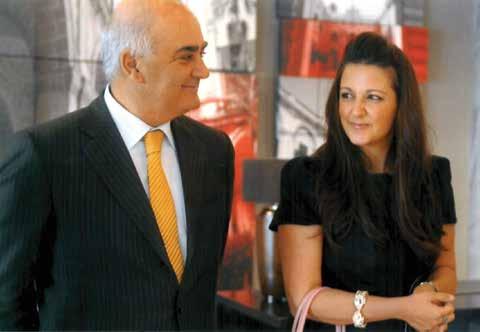
This grounded perspective has enabled the Group to think outside the box and continue to evolve, guided by a welldefined succession plan with Claire and Denise at its core. Indeed, the recently launched ODYCY – a four-star hotel on the site of the former Suncrest which opened this year – stands as a testament to this.
“I must admit to being the creative and wild one in the family,” Claire laughs. “When I took over the Suncrest a few years ago, I worked closely with the General Manager to break even, as it had been operating at a loss. Despite this, its future was uncertain, and we were very emotionally attached to the brand. We had intense internal debates, but we believed in it. So, we decided to reshape it, fill a gap in the four-star market, and take a more holistic approach to developing the entire area in front of it, including the addition of a promenade.”
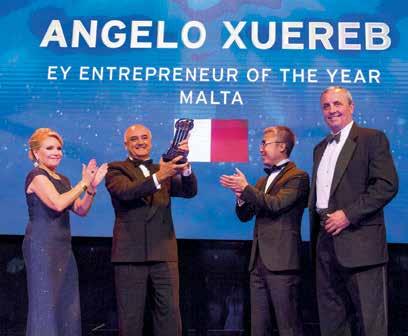
Denise emphasises their commitment to building the legacy of AX Group: “We were never forced into the family business; we had the freedom to pursue our own paths, but it was a natural choice. It was always clear that if we wanted to join the firm, we had to earn our place and respect. Over time, the company has gone through many growth cycles, and in the last couple of years, we’ve seen the largest growth investment the Group has ever made, including €70 million in ODYCY, €80 million in the new Verdala Project in Rabat, and a significant investment in our new offices in Mosta.” Furthermore, Denise says, “we’ll be transforming the Sunny Coast, in a similar manner. The Sunny Coast was the first hotel property that our father developed and, today, as a teammyself, my father and my sister - bring a wealth of expertise as we discuss its demolition, reconstruction and transformation. Our goal is to align the property with today’s business needs and bring out the best it can offer. Witnessing this full cycle of transformation together, as the business transitions across generations, is both an emotional and rewarding experience.”
“We enjoy creating and developing quality projects,” Claire adds. “And we want to ensure that we’re contributing to the Maltese economy by generating value and the employment that comes with it.” This focus will remain a priority as the Group celebrates its 50th anniversary next year, the Founder and Directors note. Looking ahead, Denise adds, the plan is to “always stay connected to the local market, as we strongly believe in enhancing the Maltese product. However, we will also be exploring opportunities beyond our shores.”
Nearly 50 years since the founding of the business, AX Group’s Chairman has much to be proud of. In 2018, he was even named EY Entrepreneur of the Year for Malta. So, does he have any plans to retire on a high note? Angelo laughs.
“I’m trying to take a break and have some time to travel. I’m proud of building my businesses step by step, with integrity, but I have no plans to stop,” he says, then adds with a smile, “just give me a blank sheet of paper, a pencil, and a ruler, and I’ll keep making plans.”

Edward Bonello sits down with TradeMalta CEO Anton Buttigieg, who explains how the agency has evolved and expanded its services along the years to respond to the challenges of the times, while offering a sterling service to customers.
TRADEMALTA, WHICH IS SET TO CELEBRATE ITS TENTH ANNIVERSARY NEXT YEAR, HAS BECOME A HOUSEHOLD NAME WITHIN THE COUNTRY’S BUSINESS COMMUNITY. In fact, the public-private partnership has helped hundreds of businesses venture beyond the island’s shores through its host of programmes aimed at bolstering internationalisation.
“Malta’s history and position in the middle of the Mediterranean have given it a unique entrepreneurial proposition. The diminutive market, however, has always been a limiting factor for businesses, that invariably find themselves looking outward to harness their full potential,” begins Anton Buttigieg, its CEO.
“From the outset, our objective has remained consistent. While our remit is not broad, it is highly focused. Managing several specialised schemes,
we are geared to support businesses that are considering internationalisation, or exporting their goods or services, from the very first steps, all the way up to successful delivery.”
TradeMalta’s success lies in its multifaceted approach to helping businesses. Historically, the organisation supported the manufacturing sector, as Malta’s economy was skewed in that direction. However, as Malta’s economy diversified, so did TradeMalta’s focus. “Today, we assist a wide range of sectors, including services, technology, training and education, health, and engineering,” Mr Buttigieg explains.
One of the key elements of TradeMalta’s success is the sterling expertise at all its levels. “Our Board of Directors has always been composed of seasoned businesspersons who have ample experience in the internationalisation sector, having successfully led companies that grow
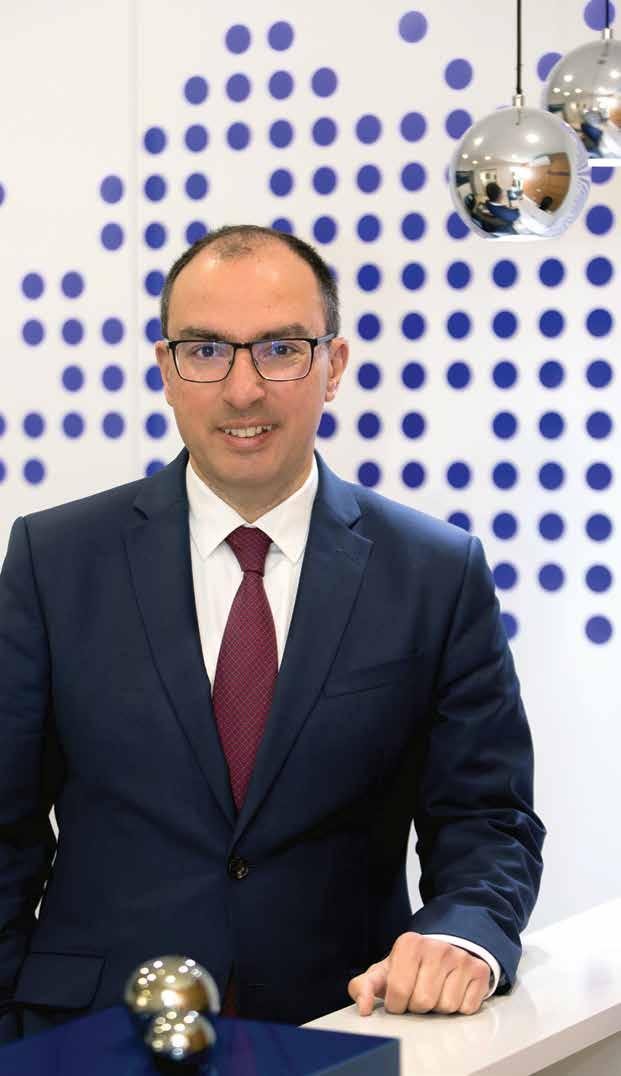
“Managing several specialised schemes, we are geared to support businesses that are considering internationalisation, or exporting their goods or services, from the very first steps, all the way up to successful delivery.”
“Each year, we hold a highly specialised course which acquaints businesses with the ins and outs of internationalisation and exportation.”
internationally themselves. This ascertains that TradeMalta’s policies are always inspired by a solid basis of on-the-ground knowledge. Moreover, TradeMalta has enjoyed an advanced rate of retention within the ranks of its expert employees, who have over the years built an excellent rapport with the businesses they help. This, in turn, translates into a certain peace of mind for businesses that know that they can rely on the expertise of our people,” the CEO continues.
TradeMalta offers a range of initiatives designed to support Maltabased businesses in their internationalisation efforts. “Probably our most popular incentive is assisting businesses when they exhibit at relevant international fairs. These fairs, whether repeat events or specific new opportunities, are held across the globe and provide invaluable exposure for Malta-based companies,” the CEO notes.
Moreover, TradeMalta is always quick to respond to any extraordinary circumstances that may arise, such as the recent COVID-19 pandemic which paralysed businesses around the world, for the better part of two years.
“Mindful of the challenges our businesses faced during the COVID years, we quickly introduced incentives to help them expand their operations by fully leveraging the digital realm. For instance, we launched a scheme allowing companies to request a capped reimbursement for their online advertising expenses. While we are aware that larger companies may have handsomer budgets than we can fully support, the funds provided have made a significant impact in helping smaller businesses, for whom this support has gone a long way.”
The scheme proved so successful that TradeMalta continues to offer it to this day.
COVID-19 also gave businesses the opportunity to thoroughly reassess their models, acting as a catalyst for them to take some much-needed decisions. “Once the lockdowns were lifted, demand for our services surged by approximately 40 per cent,” Mr Buttigieg notes. “Businesses immediately sought to attend and exhibit at international fairs once again. It is evident that while remote meetings served businesses well during lockdown, the personal touch of in-person business remains unparalleled.”
In this vein, TradeMalta also organises a series of trade missions to countries identified as offering significant business opportunities for Malta-based businesses. “Our trade missions are based on a research process which identifies the countries our businesses are most interested in. We typically focus on strategic markets where local businesspeople see potential and where we believe there could be commercial opportunities. These missions, which take place roughly twice or three times a year, have taken businesses to countries in Sub-Saharan Africa and various Middle Eastern nations,” the CEO notes.
Moreover, TradeMalta performs an educational function, as it seeks to equip businesses with the necessary knowledge to be able to venture into the daunting world of internationalisation. “Each year, we hold a highly specialised course which acquaints businesses with the ins and outs of internationalisation and exportation. These courses, delivered by seasoned leaders in their fields, are open to businesses interested in internationalisation. They provide a detailed understanding of what it takes for a company to succeed internationally at all levels, from legal and administrative requirements to an understanding of cultural norms and traits,” Mr Buttigieg explains.
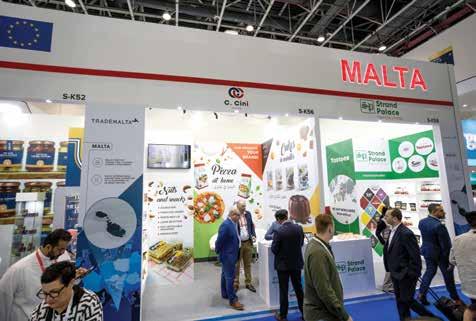
When asked about the most significant challenges companies face when venturing internationally, Mr Buttigieg notes how the difference in size compared to their international counterparts becomes stark on the global stage. “Our companies often face limitations in resources and financial prowess when entering new markets,” the TradeMalta CEO acknowledges. “Entering a new market is akin to starting afresh. While companies may have a robust administration and production system in place at home, they need to build their business anew in terms of creating relationships and establishing connections in the new jurisdiction. This
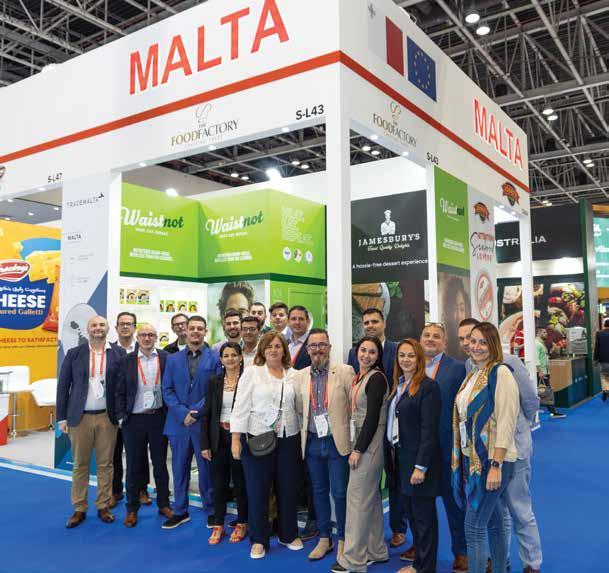
includes understanding the legal and business environment, becoming acquainted with local customs, and navigating many other details. Naturally, this is a complex process which requires significant human and financial resources.”
“From our experience, the most successful companies are those that typically concentrate on one market at a time,” he advises. “Trying to expand into multiple markets simultaneously can be overwhelming, extremely costly, and counterproductive. We advise many of our clients to focus their energy on establishing a strong position in a single market. Once they have a solid foothold, they can then proceed to the next.”
TradeMalta is increasingly relevant to businesses that intend to seek international opportunities, given the constantly shifting geo-political landscape. “We all recall the immense commercial opportunities Malta enjoyed in Libya until 2011. When the environment shifted dramatically, many businesses were forced to take critical decisions overnight. TradeMalta remains a valuable ally, guiding businesses as they explore prospects in other regions, both nearby and farflung.”
“My advice to businesses is to come forward, and talk to us,” Mr Buttigieg says, as he emphasises the importance of early engagement. “Let’s meet as early as possible so we can help you navigate the challenges ahead. Moreover, seek out and learn from other companies that have been successful. We are blessed with a cohort of Malta-based businesses
that have made a very good name for themselves and the country, and that have a wealth of experience to share. In most cases, they are more than willing to share their wisdom about their experiences and pain points,” he advises. “The power of networking cannot be overstated,” the CEO says.
Ultimately, while TradeMalta can lead companies to the proverbial pond, it is the businesses themselves that know their business and markets best. “At TradeMalta, we do our best to provide the tools and support necessary for international success, but it all boils down to the grit and energy of the businesses themselves. They know their operations best and where they want to take them. We are only too happy to guide them on their path to international success,” Mr Buttigieg concludes.
“At TradeMalta, we do our best to provide the tools and support necessary for international success, but it all boils down to the grit and energy of the businesses themselves.”
Offering a strong proposition of client-centric, bespoke education, and corporate training for local companies to upskill their employees, BELS Language Schools are internationally accredited. Owner and CEO Rebecca Bonnici talks to Warren Joseph Bugeja about her leadership style, and how “it takes a village” to make her business successful and sustainable.


THE BELS STORY BEGINS IN GOZO IN 1995, WHEN REBECCA BONNICI’S FATHER TRANSFORMED A TRADITIONAL GOZITAN FARMHOUSE IN THE TRANQUIL COUNTRYSIDE OF KERCEM, INTO A LANGUAGE SCHOOL. Despite initial challenges with planning, permits, and promoting an unknown location to the English Language Teaching (ELT) industry, the school welcomed its first students in 1997.
The school’s deep connection with the local community and commitment to offering an authentic Gozitan experience won over initial sceptics, eventually winning the Gozo Tourism and Investment Award in January 2024.
The school attracts mature adult learners who appreciate its warm, family-like atmosphere, state-of-the-art educational facilities, bucolic views of the stunning surroundings, and full immersion into the Gozitan lifestyle, supported by dedicated local staff and host families.
Before assuming the company’s leadership at the age of 25, Rebecca had been gaining experience teaching in one of the larger English language chains on the mainland whilst pursuing a degree in English and Communications at the University of Malta. Between lectures, she hopped over to Gozo to help with bookings, managing host families, processing payments, and venturing into sales and marketing.
On the advice of her parents, given the dearth of Director of Studies graduates on Gozo, she also achieved a Level 7 qualification in ELT, making her the only language school owner on the Maltese Islands who also possesses a DELTA qualification
“We recognised that fluency in English does not always equate to proficiency in business English – a distinction that is crucial in professional settings.”
PHOTO BY INIGO TAYLOR

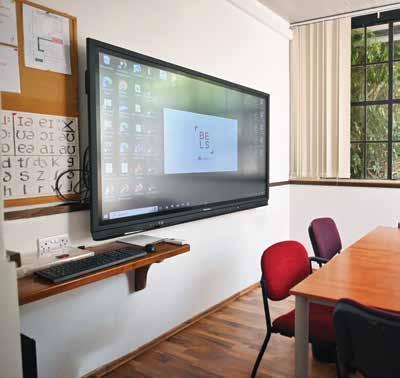
European Parliament (MEPs). The return rate of BELS’s business and general English clients is proof of the quality and effectiveness of their programmes.
(a higher English language teaching qualification for experienced teachers). This allows Rebecca to fully engage with the pedagogical aspects of the business. “When I sit in a room with my staff, and we talk about learner outcomes and lesson objectives, I am actually plugged into what they are saying,” she enthuses.
Realising that there was only so much volume that could be directed to Gozo, the CEO decided to expand operations and open another school in St Paul’s Bay, away from the glut of ELT centres in St Julian’s and Sliema, yet appealing to those seeking a vibrant, youthful environment near the sea. As a young mother, Rebecca wanted to prioritise safety and security for parents, so, together with her team, she devised a seasonal programme for teenagers, with round-theclock supervision by staff in partner accommodation.
“Both schools exist in beautiful synchronicity and homogeneity,” she beams, “catering for two distinctly different clients” and providing a unique portfolio for agents when compared to the competition in Malta or overseas. The schools target a wide range of clients, including high-profile companies in Europe and Members of the
“BELS prides itself on offering value for money, not by being the cheapest but by providing exceptional client-centric service and quality education.”
Prior to the pandemic, BELS began to tap into corporate training, primarily when approached by companies needing to enhance their employees’ English communication skills. However, the pandemic served as a catalyst for a strategic pivot. With traditional language tourism halted, the company focused on developing specialised English courses for local companies. “We recognised that fluency in English does not always equate to proficiency in business English – a distinction that is crucial in professional settings,” Rebecca emphasises.
In response to this need, BELS developed 24 industryspecific courses recognised by the MFHEA (the Malta Further and Higher Education Authority), targeting sectors such as insurance, iGaming, banking, and healthcare. “These courses were not just a lifeline during the pandemic; they have since become a significant part of our business, accounting for about 10-15 per cent of our revenue,” Rebecca states. The corporate training programmes have helped shift the local perception of BELS as another school catering for young students in Paceville to BELS as a provider of quality education for professionals.
“People are at the heart of the customer experience, and if staff cannot communicate in English, they cannot deliver the level of customer experience that will set the companies they work for apart from competitors in the field,” Rebecca maintains.
As the tourism shoulder season grows longer, businesses like hotels and restaurants increasingly need staff from April to November. This shift in the tourism industry has led to a greater focus on maintaining full operations year-round, making the Skills Pass vital for both employees seeking stable, year-round contracts outside of Malta’s peak tourist seasons and business owners looking to adapt to these changes.
BELS supports companies by first understanding their specific needs and desired outcomes before tailoring training programmes accordingly. After assessing employee skill levels through an online test, BELS offers customised training solutions which can be delivered in-company, at one of its schools, or online. Companies can also receive assistance
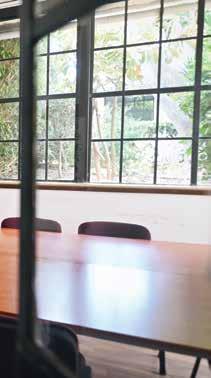
“The demand for English language education is evolving, and so is our approach. We are committed to pushing the boundaries of service and innovation.”
with funding applications, though many choose to self-finance, recognising the value of continuous professional development. This training often serves as a team-building exercise, bringing together employees at all levels, from junior staff to CEOs.
Despite being a medium-sized player in a competitive industry, “BELS prides itself on offering value for money, not by being the cheapest but by providing exceptional client-centric service and quality education,” Rebecca remarks. The team’s dedication to continuous learning has been a key driver in BELS’s growth, evident in the innovative use of technology, such as interactive touchscreens replacing whiteboards and integrating virtual reality (VR) into their teaching methods. “I believe in the value of leveraging technology to increase the effectiveness of learner experience. The key takeaway from my DELTA experience all those years ago was that personalisation aids retention,” she explains. Furthermore, BELS’s rigorous service evaluation process “helps us fine-tune our offerings based on client feedback, ensuring that we meet the evolving needs of our students and corporate clients.”
The CEO acknowledges she could not have achieved all this without a deep respect for the collective effort required to run a thriving business. She learned from her parents that true success is not just about financial gain but also about fostering a happy, supportive environment where every role is valued equally. Rebecca has truly invested in her team, recognising that her business’s success relies heavily on her staff. Not only is her team diverse, representing multiple nationalities, but they are also multi-skilled, bringing a wealth of experience from various sectors, including tourism, education, technology, leadership, and management. Rafael Carraca, BELS Gozo’s Director of Studies, speaks to the unique atmosphere Rebecca has fostered: “There is this family vibe here; it is unique. I’ve never seen anything like this. I don’t even feel like I’m going to work. I’m excited to come here. If there is a problem to face, I want to come here to tackle it.”
This belief in the transformative power of learning is central to BELS’s ethos and has been key to building a strong, sustainable school that attracts both dedicated employees and loyal students.
“We are all drinking the cool aid,” Rebecca laughs. Her leadership style is grounded in humility and practicality. As a working mother, Rebecca values time and is known for her direct, honest approach: “Waffle is not something that I do,” she says - a quality that serves her well as the chairperson of FELTOM (the Federation of English
Language Teaching Organisations Malta), where she lobbies to maintain industry standards.
She also sits on the ELT Council and was recently appointed to the MTA Board. Despite the peer recognition, Rebecca is aware she is not a pioneer. “I wasn’t around in the ‘70s when ELT started in Malta, and I am very respectful of the people who came before me, but I take the humility I was taught and what I have learnt, and then I apply it to my business to make it different and successful.”
International accreditation is a cornerstone of BELS’s commitment to quality, enhancing the school’s reputation with foreign partners and clients. In addition to being one of 34 locally licensed ELT centres, BELS is proud to be among the 14 FELTOM-accredited schools in Malta. As Rebecca underlines, “tuition is at the heart of what we offer.” This dedication to excellence was recently validated by accreditation from EAQUALS, the global gold standard for language centres, earned after a rigorous four-day assessment and inspection. “These certifications are not just for show,” she insists. Rather, they represent BELS’s commitment to maintaining high standards in every aspect of business, from tuition to consolidating and upping the accommodation offering.
“As we look to the future, we are not going to rest on our laurels. We took a decision to go big or go home. The demand for English language education is evolving, and so is our approach. We are committed to pushing the boundaries of service and innovation,” Rebecca affirms. While staying true to its roots as an owner-run, homegrown school that values its clients, employees, and the broader community, BELS’s goal is to continue delivering high-quality education that meets the needs of both local and international clients, reinforcing its position as a leader in the industry.
Find out more about BELS on www.belsmalta.com

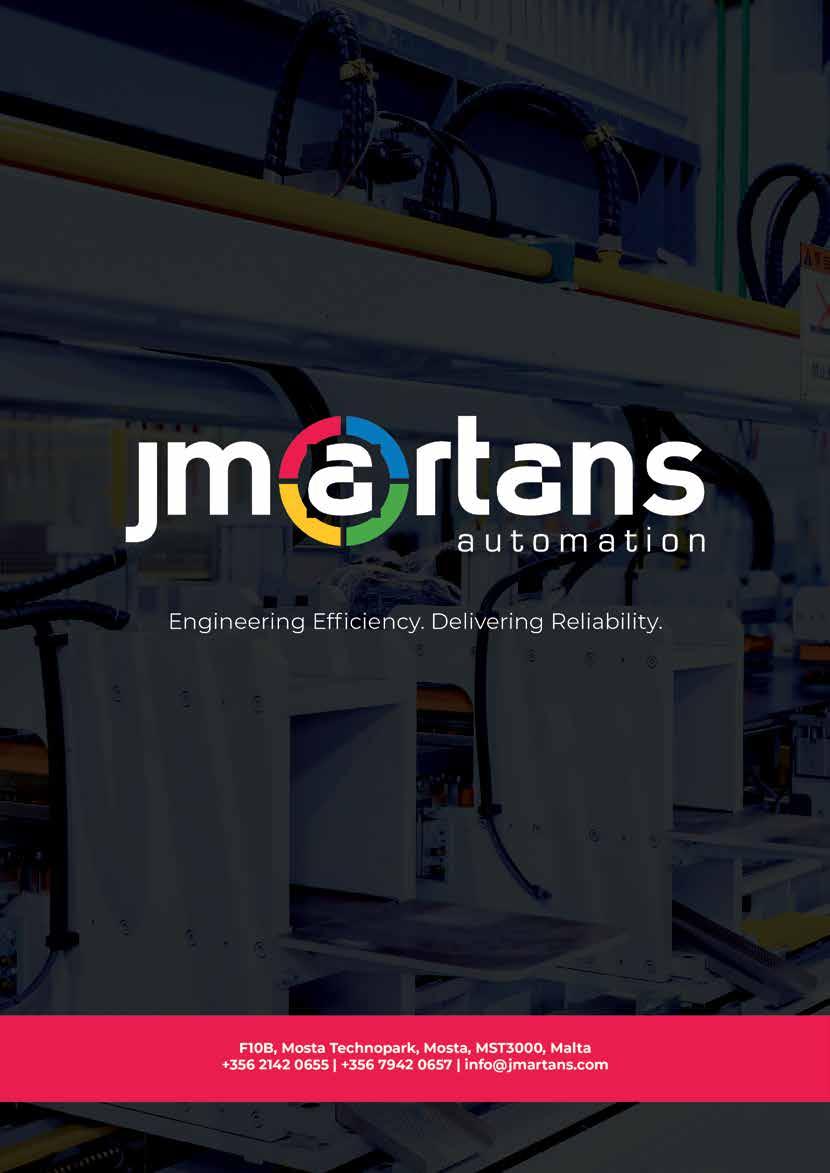

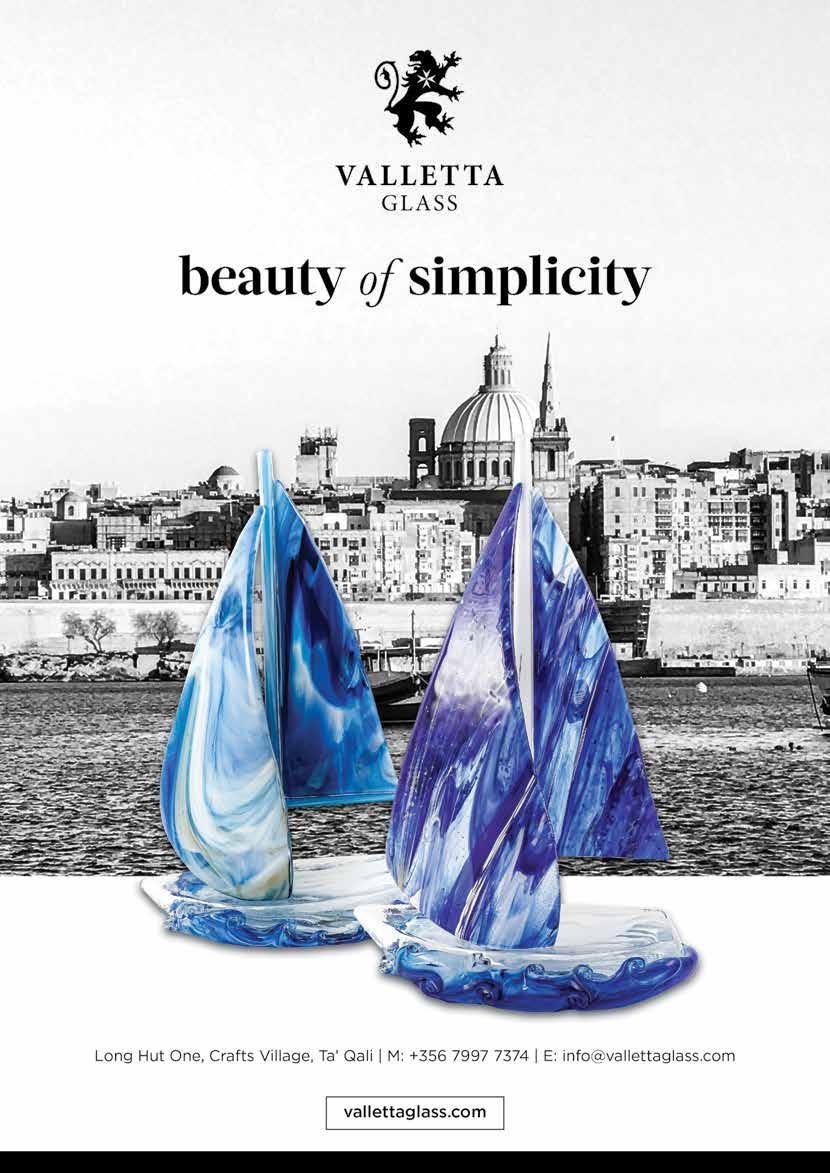

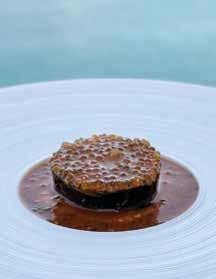


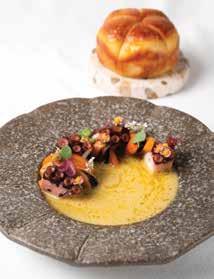


Malta is as renowned for its rich history as it is for its vibrant culinary scene. Here, Sarah Muscat Azzopardi explores the flavours, inspirations, and personal reflections that shape the island’s contemporary cuisine, straight from the source. Diving into the kitchens and minds of some of Malta’s most celebrated chefs, she learns about their favourite dishes and thoughts on the Maltese summer, offering a tantalising glimpse into the island’s gastronomic landscape.
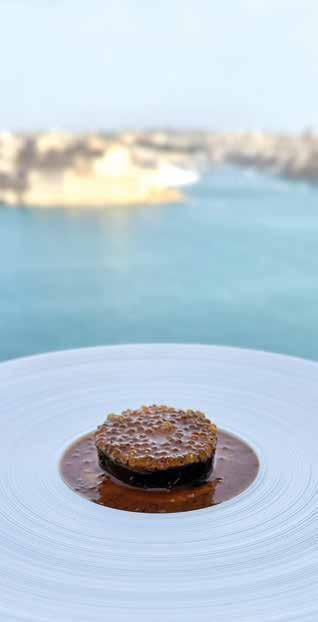
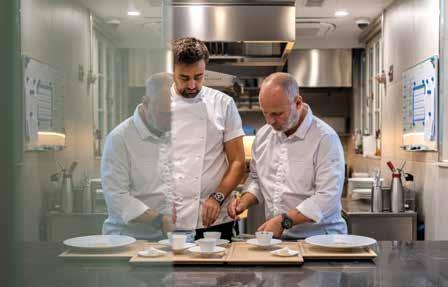
‘Rabbit is one of the national dishes of Malta, so it’s important that we had a rabbit dish on the menu.’
Award-winning British chef and restaurateur Simon Rogan is one of the pioneers of the farm-to-fork movement in the UK, and holds three Michelin stars for his Lake District restaurant, L’Enclume. His first Mediterranean restaurant, ION Harbour, is the only restaurant on the island to receive two Michelin stars. Oli Marlow, who first started working with Simon in 2012, serves as Executive Chef.
Both Simon and Oli’s favourite dish from ION’s menu is inspired by a local classic: rabbit. “Rabbit is one of the national dishes of Malta, so it’s important that we had a rabbit dish on the menu,” explains Simon, although of course, the stuffed rabbit at ION is not presented in the way most Maltese are used to.
“The dish is stuffed with lemon thyme and oyster mushrooms, and then steamed and wrapped with Swiss chard from Renny’s farm, a hydroponic farm on the island which grows incredible quality seasonal herbs and vegetables. We then make a jubilee sweetcorn puree, and finish with a sauce made from the roasted bones and juices thickened with preserved lovage stems and pickled tapioca,” he says.
“I don’t get to cook with rabbit that often in the UK,” Oli reveals, adding “a lot of our guests in Malta are tourists and might not have tried rabbit before, so it’s great to give our diners new experiences and show them a little bit of the country.”
Sharing their thoughts on Maltese cuisine, Simon highlights the quality of local produce, affirming “our tasting menu includes dishes such as Siggiewi strawberries and bee pollen cake, and marigold and milk ice-cream, which makes the most of the glut of strawberries on the island throughout May.” The menu also features nods to the classic dishes served at his restaurants across the world, he continues, “but using Maltese ingredients, such as ‘ION’ which is a replica of our signature caramelised miso dessert, which we serve with Maltese bambinella pear.”
“I love how seasonal Maltese cuisine is,” Oli adds. “Typically, in the UK, we would get crops like asparagus once a year, in spring. In Malta, however, we enjoy two harvests. The first is in February/March/April, when the weather is getting warmer after the so-called winter. It then gets a little too hot to grow until October/ November, when you almost get another spring.”
As for foods the chefs associate with Malta’s summer, Simon’s pick is a simple caprese salad. “Nothing beats it: mozzarella, tomato, and basil salad with Maltese olive oil, salt, and pepper. Eaten in the sun, by the sea, with a glass of wine and I’m very happy.” For Oli, it’s ice-cream and local beer, Cisk. “My favourite flavour of ice-cream is pistachio, but you can make a lovely strawberry icecream with some amazing locally grown strawberries. As for Cisk, no preparation is required!”
‘This dish is based on a lot of
touch of modern cuisine and locally sourced ingredients.’
Accomplished chef and Chef Patron at The Golden Fork Letizia Vella is celebrated for her culinary expertise honed at Michelin-starred establishments like Dinner by Heston Blumenthal and The Fat Duck. She also recently served as one of the judges on the first season of MasterChef Malta.
“Each and every dish that we prepare consists of hours of research, thoughts and trials, so they become like our children. We love them equally and shouldn’t have a favourite child,” smiles Letizia, hard pressed to name a favourite dish on her menu.
With that being said, she relents, admitting, “one dish that I will definitely go for is the mussel and saffron custard, with slow-cooked Gozitan octopus, mussel meat, mussel emulsion, and milk bread on
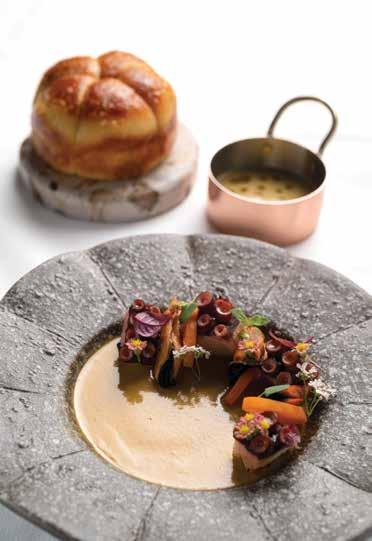
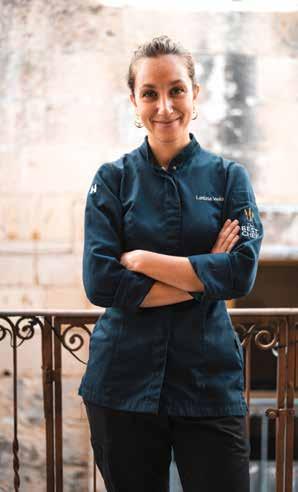
the side. This dish is based on an abundance of fresh Mediterranean flavours, with a touch of modern cuisine and locally sourced ingredients.”
Speaking of local food, the chef points out that Maltese cuisine has strong influences from different countries, with each culture leaving its mark, resulting in a diverse and flavourful food culture. The idea at The Golden Fork, she maintains, “is to express the Maltese traditional essence in a very contemporary and refined way. I use complex transformation techniques to create apparently simple dishes that are immediately recognisable but new at the same time. I want people to have an authentic Maltese experience, while enhancing the taste with innovative techniques,” singling out the kusksu dish, which takes off from a classical recipe that has been modernised.
As for local food she associates with summer, Letizia notes that Maltese cuisine is heavily influenced by the sea, as fish and seafood are staples in the Maltese diet. “Popular dishes in summer are definitely seafood, as well as Maltese ftira, filled with a variety of ingredients such as tuna, tomatoes and onions. Maltese cuisine is a true reflection of the island’s history and cultural heritage, and is best enjoyed fresh and local,” she shares.

‘A rich but balanced dish with flavours of crustacean, heat, umami, and a lingering acidity – it’s rooted in classical French cooking but with Japanese and Asian flavours combined.’
Kurt Micallef is Head Chef at Michelin-starred Fernandõ Gastrotheque, where his delicious fusion dishes combine Mediterranean and Asian influences. Kurt’s culinary experience stems from years of hands-on involvement within Maltese kitchens; some of which are renowned names within the local scene.

“For this dish, white shrimps are turned into a mousse and sandwiched in a red pepper crêpe. Two sauces adorn the plate – the first a rich chicken and prawn jus seasoned with a fermented red pepper paste, white soy sauce and roasted garlic; and the second a classical shrimp nage which is seasoned with yuzu juice to give a fantastic floral acidity and balance the rich flavours in the dish. Cucumbers pickled in rice vinegar infused with kombu finish off and refresh the palate,” he says, explaining the complex arrangement of flavours.
Describing the dish as a very personal one as it illustrates his career path, Kurt adds, “it’s rooted in classical French cooking but with Japanese and Asian flavours combined – a rich but balanced dish with flavours of crustacean, heat, umami, and a lingering acidity. It shows skill, technique, and craft but then eats very comforting and heart-warming.”
Diverting his attention to Maltese cuisine, Kurt views local food like rabbit stew, brodu (broth), soppa tal-armla (widow’s soup), and minestra (vegetable soup) as staples in his household growing up. “It evokes nostalgic memories and reminds me of my mother’s cooking,” he smiles, admitting that while it doesn’t translate much into the food he cooks today per se, there are always food memories that go into certain dishes.
“Green olives and marjoram are traditionally used as condiments in a local fish stew or soup, which I have taken as flavour memories and paired with the current fish main course at the restaurant – a pesto of sorts is made from green olives that are pounded with marjoram, roasted garlic oil, colatura, and smoked soy sauce, which give a new dimension to the classical pairing,” he explains.
Finally, revealing his local food preferences in the hot months, the chef favours fresh and lighter foods in summer, basing his diet on fresh fruits and salads mostly, “although I think a quintessential food that is associated with summer has to be a Maltese ftirabiz-zejt enjoyed by the sea.”
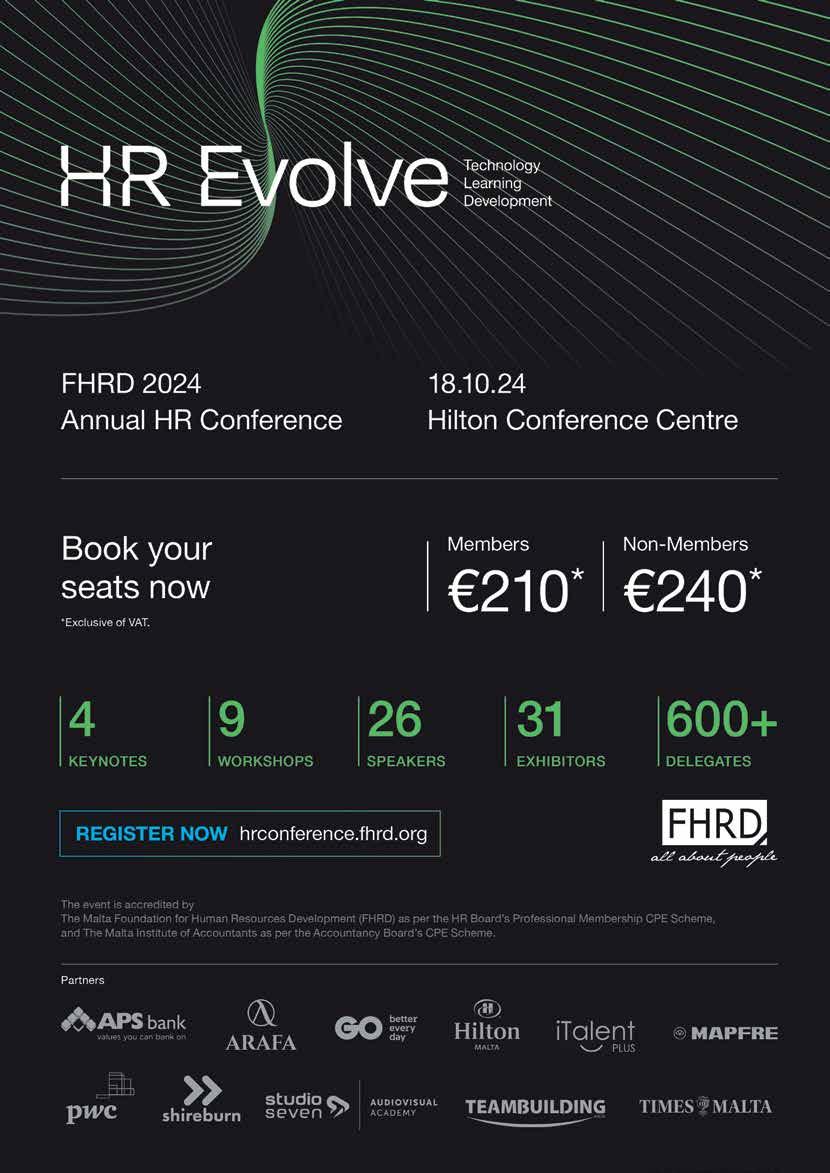

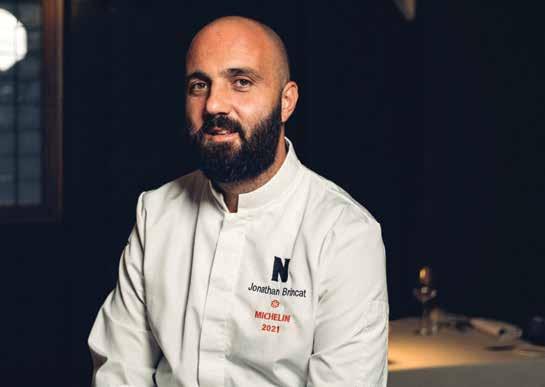
‘It bursts with flavours that encapsulate what our island has to offer and revolves around my philosophy of taking humble ingredients and elevating them to their best capabilities.’
Award-winning and Michelin-starred chef Jonathan Brincat, also known as Noni, is the founder and co-owner of the Valletta restaurant with the same name. He has valuable experience in different roles at the kitchens of five-star luxury and gastronomic establishments in London, Australia and Asia.
Stating his favourite dish on Noni’s menu, Jonathan names his Ta’ Guzman Farm organic potatoes, braised snails, spinach, fresh garlic, and black pepper, explaining, “it bursts with flavours that encapsulate what our island has to offer and revolves around my philosophy of taking humble ingredients and elevating them to their best capabilities, letting the ingredients shine through.”
The chef describes Maltese cuisine as humble, multicultural, seasonal, and ingredients-driven, which, in his view, is what one should expect from an island like Malta. “Our whole ethos revolves around Maltese cuisine and traditions, may it be something that was eaten 500 years ago or something much more recent which natives consider part of their heritage,” he maintains, describing how local food translates into his cooking today.
As for food he associates with Malta’s summer season, for Noni, it’s got to be a simple ftira biz-zejt “A good, fresh ftira, smudged with ripe zenguli (elongated) tomatoes, olive oil, sea salt, a crack of black pepper, and a couple of basil leaves, with some table olives, gbejna and raw onions on the side – not inside the ftira, so you can taste each ingredient!”


‘This dish is an expression of my love for local produce, specifically wild-caught fish, and my passion for Asian, particularly Thai, cuisine.’
Paul Buttigieg is Head Chef at family-run Tmun Restaurant in Gozo, and is counted among the foremost ambassadors of local cuisine across the Maltese Islands. A traditional chef with a keen eye for the possibilities the sea has to offer, he brings his own current twist to Mediterranean cuisine with a focus on local seafood with Asian influences.
Highlighting his personal favourite dish on the Tmun menu as a local denci fish presented in a ‘tom yum’ sauce, Paul recounts having the opportunity to visit Thailand a few years back, where he immediately fell in love with Thai food. “The tom yum soup, in particular, captivated me with its burst of aromas, and its umami warmed my heart. Upon my return, I worked tirelessly to replicate Thai flavours, especially the balance of the four main flavour profiles: spicy, salty, sour, and sweet. This dish is an expression of my love for local produce, specifically wild-caught fish, and my passion for Asian, particularly Thai, cuisine,” he smiles.
Reflecting on the island’s own cuisine, Paul describes Maltese cuisine as a melting pot of Mediterranean flavours shaped by our diverse history and cultural influences. “In Malta, we are fortunate to enjoy a variety of high-quality fish and fresh produce. At my restaurant, I regularly update the menu to showcase local ingredients that are in season at that particular time of the year,” he maintains.
As for food he typically associates with Malta’s summer, the chef points to the island’s figs as particularly worthy of note, so much so that they inspire another beloved dish on his menu. “In Maltese summers we have two fig seasons – one in June (bajtar ta’ San Gwann) and another in August (bajtar ta’ Santa Marija). A staple summer dish on our menu is the fig tart. In it, the sweetness of the figs is combined with local blue cheese, walnuts and a 10-yearold balsamic, all encased in a filo pastry tart.”



“My personal favourite dish, which is served at Caviar & Bull, is the Lobster Popcorn. It’s really unique and I enjoyed the creative process of coming up with it, back in the day,” Marvin reveals, explaining that he actually dreamt up the dish during a cinema outing with his children – which explains the popcorn element!
Sharing his thoughts on Maltese cuisine, and how this translates into his food, the chef explains, “I really enjoy
‘I really enjoy the use of local ingredients and the impact our history has had on the culinary scene.’
Chef and restaurateur Marvin Gauci is the brains behind some of the island’s most unique culinary concepts, running several restaurants in Malta and Budapest, including flagship Caviar & Bull. He also serves as the chief chef of Dinner in the Sky in Malta, and holds the position of Ambassador of Gastronomy for the Maltese Islands.
the use of local ingredients and the impact our history has had on the culinary scene.”
Speaking of Malta’s summer, and the food associated with it specifically, Marvin states a preference for fresh fruit salad in the hot months. “My family makes fresh fruit salad every day in summer – it really hits home. In summer, I tend to appreciate the simplicity in my dishes, and I also love fresh fish and seafood.”

‘A great balance of sweet, savoury, meaty, and juicy, and just hits the spot every single time. I wouldn’t change it for anything.’
JP Debono is owner and Head Chef at Danny’s Kitchen, a popular restaurant that has become a favourite among local foodies for fusing elements of snack bar-esque comfort food and high-brow culinary artisanship.
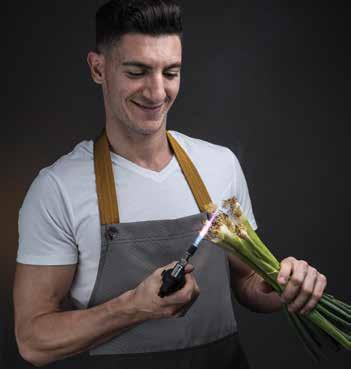
JP’s favourite Danny’s dish is one that the eatery’s loyal following is bound to be familiar with: the OG cheese and onion burger, a beloved dish that’s been on the menu – and hasn’t changed – since day one.
“For me, it’s everything a burger should be – one of the simplest of dishes, and executed well. It’s a combination of high-quality ingredients, proper cooking techniques and thoughtful assembly. A great balance of sweet, savoury, meaty, and juicy, and just hits the spot every single time. I wouldn’t change it for anything,” he smiles.
Describing Maltese cuisine as a diverse blend of Mediterranean flavours and influences, the chef says it reflects the island’s rich history and cultural interactions with various civilisations – a mix of Italian, French, Arabic, and British.
“From local fresh seafood, warm rustic and crusty bread to heartwarming flavourful winter dishes, our cuisine is definitely not one to miss out on. At Danny’s, we offer a variety of dishes mainly influenced by Mediterranean flavours, from rich tomato-based sauces to buttery toasted bread, and salt and vinegar-seasoned fries. To me, it’s a nice blend with a good variety for everyone,” he maintains.
As for local summer staples, JP recounts fond childhood memories associated with food on the islands. “As I was growing up, summer was a time when most days would be spent by the sea, and evenings would mean sitting outside someone’s house in a village side street. This also brings back memories of countless tuna ftajjar, alongside a freshly home-made caponata, a mix of gbejnietand Kinnie to wash it all down. It’s a really simple dish that requires the most basic of wellsourced ingredients and evokes a nostalgic summer day or night for the majority of the Maltese,” he shares.

CEO Nirav Patel tells Edward Bonello how Andaria can help companies leverage data-driven opportunities through embedded finance.
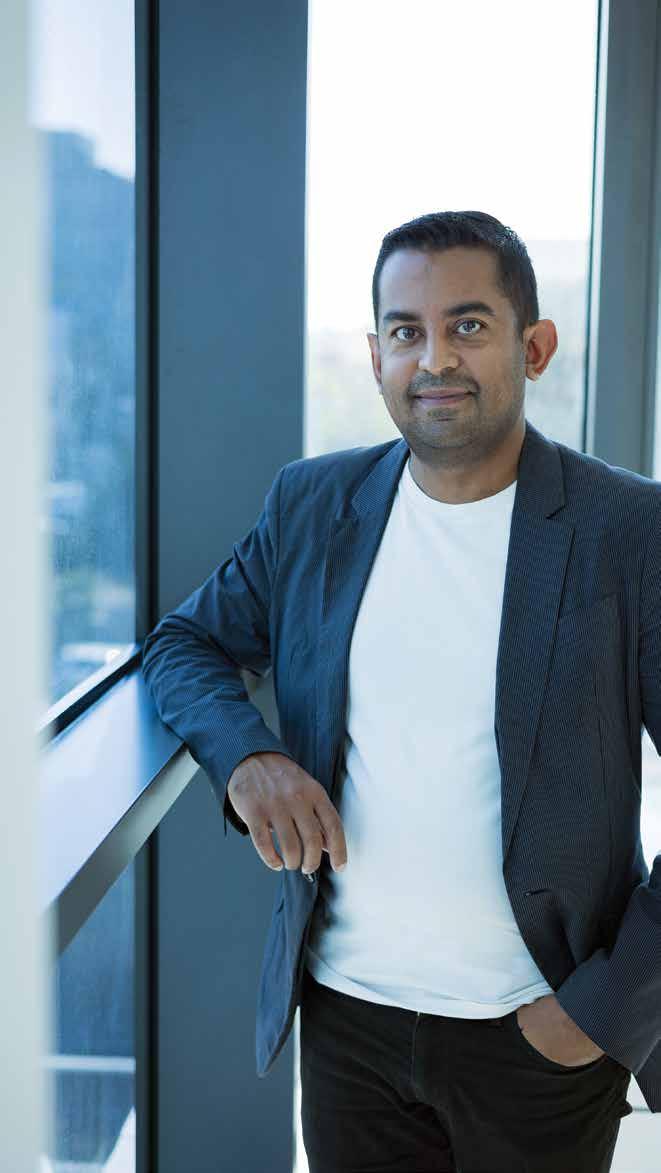

“Knowledge is power, and sometimes, a crucial piece of information is enough to allow a business to make a decision that sets it apart from its competition.”
IN A WORLD WHERE DIGITAL TRANSFORMATION HAS FAR MOVED ON FROM BEING A FLASHY BUZZWORD, ESTABLISHING ITSELF AS A CRUCIAL STRATEGIC NECESSITY, Andaria is at the forefront of providing businesses with an arsenal of tools to help them up their game on the financial services front.
“Knowledge is power, and sometimes, a crucial piece of information is enough to allow a business to make a decision that sets it apart from its competition,” explains Nirav Patel, CEO at Andaria.
“Businesses spend immense amounts of resources to obtain information, through market research and other R&D efforts – yet few understand that they might be sitting on a mountain of crucial information that is underutilised at best,” the CEO notes.
Through Embedded Finance, Andaria offers a comprehensive portfolio of tools which allows businesses who have a captive and returning customer base to better engage with their customers, offering them an improved service experience.
“Andaria offers businesses the possibility of managing all their customer payments through our seamless Embedded Finance platform, which can be tailored to their brand identity. Customers will be aware that the platform is managed by Andaria, however their experience will be uninterruptedly themed to the brand of the platform they are already familiar with. At a first level, this provides companies with the peace of mind that their customer payments are handled safely and efficiently by world-class professionals,” he says. In fact, Andaria is a leader in the field, and is licensed to operate from Europe (headquarters in Malta) and the United Kingdom, servicing several household names on the international stage.
Moreover, the system can be used to reward customer loyalty while opening new revenue streams and reducing operational costs. “Through Embedded Payments, Andaria acts like a bank, providing a clean, seamless payment solution
that requires minimal effort on the business’ part. This solution is ideal for businesses and organisations which have a loyal customer base or a returning cohort of clients, such as football clubs, shopping malls and many others.”
For businesses, it’s an opportunity to enhance customer engagement with a cohesive, user-friendly financial ecosystem. However, the advantages of using Andaria’s embedded finance systems go beyond.
“Our systems allow companies to leverage the immense power of data through embedded finance to give them an unparalleled edge in their market. Organisations would be able to issue their own branded payment cards, which their loyal fan base would be able to use. A loyalty scheme linked to the card would ensure the continued use of the card. Through every transaction, the business would gain access to a wealth of data, enabling it to make strategically relevant decisions,” Nirav continues.
The data collected from such transactions is invaluable. Not only does it provide insights into customer preferences and behaviours, but also allows businesses to update and refine their offerings continuously. “Every sale gives a great deal of information about the customer base,” Nirav notes, as he underlines the depth of understanding that can be gleaned from transaction data.
Data is the new gold, but similarly, it needs to be mined and refined. “When properly harnessed, data becomes knowledge – a powerful tool for businesses looking to stay ahead in a competitive market. Andaria makes it extremely easy for businesses to channel this immense power using a dashboard which allows clients to analyse and understand their data in depth, transforming raw numbers into actionable insights, included in the system.”
Nirav is also aware that data never exists in a vacuum and can quickly become irrelevant or dated, noting, “data can become stagnant if not constantly updated. To this end, Andaria offers ongoing data management, ensuring that businesses have the most up-to-date information, and allowing them to make the bestinformed decisions, continuously.”

The applications of the solution are endless, and Nirav explains that the resource remains largely untapped locally. “We see very promising potential across various sporting disciplines, extending beyond just football. Additionally, we believe that other industries, such as shopping malls, yacht marinas, and insurance, among others, also stand to benefit significantly from this solution.”
Andaria’s top priority is an unwavering commitment to customer privacy, along with strict adherence to the highest legal standards in data management.
“Customers will always have full control over their data, with a clear opt-in option that is essential for ensuring peace of mind,”

Nirav affirms. “We respect our customers and their wishes, and strictly adhere to the law. Security remains a top priority.”
Looking ahead, Nirav is optimistic about the future as he believes that Andaria is on the cusp of leading a transformative shift in the way that businesses operate and interact with their customers. “As we continue to push the boundaries of the financial services industry and embedded finance, we will continue to provide the necessary platforms to help businesses leverage the immense opportunities at hand, essentially transforming data into knowledge, and ultimately, into business success,” he concludes.
“Through Embedded Payments, Andaria acts like a bank, providing a clean, seamless payment solution that requires minimal effort on the business’ part.”

‘Family businesses operate differently’:
The Family Business Office supports family businesses through various initiatives including by providing guidance on eligibility criteria for several programmes and offering financial assistance through tax incentives, as well as consultancy grants to help with governance and succession planning, Regulator Joseph Gerada explains to Sarah Borg

“A major part of our work involves educating business owners. We help them determine if their business qualifies as a family business under the Family Business Act and assist them in making the necessary changes to benefit from our programmes.”
FAMILY BUSINESSES ARE THE BACKBONE OF THE ECONOMY, MAKING UP 65-80 PER CENT OF ALL ENTERPRISES IN EUROPE AND PROVIDING 40-50 PER CENT OF JOBS ON AVERAGE. However, not every family-run business qualifies as a family business. So, what exactly defines a ‘family business’, and who determines its status?
Dr Joseph Gerada, Regulator at Malta’s Family Business Office (FBO), offers valuable insights into the unique challenges and significant contributions of family businesses on the island and into the FBO’s role in supporting their growth, addressing their specific needs, and fostering a conducive environment for continued success.
Established in 2017, the FBO is dedicated to regulating and supporting family businesses. “We set up this unit to address the specific needs of family businesses, which operate differently from other enterprises,” Dr Gerada begins.
Family businesses have their own unique dynamics, particularly in areas like promotion, governance, and succession planning, he says, explaining that according to the Family Business Act, a business must meet specific criteria to be classified as a family business. “For instance, there should be at least two family members involved in a direct line, and no single family member can own more than 80 per cent of the business,” he adds.
Dr Gerada outlines the FBO’s mission: “Our goal is to implement the Family Business Act and offer practical support. A major part of our work involves educating business owners. We help them determine whether their business qualifies as a family business under the Act and assist them in making the necessary changes to benefit from our programmes.”
A key initiative by the FBO is the reduction of stamp duty on family business transfers. “Another aspect of our mission is to offer financial assistance, specifically, through tax incentives,” Dr Gerada explains. “When a family business is passed down within the family, we offer significant reductions, or, in some cases, eliminate stamp duty and taxes entirely.”
In addition to tax relief, the Office offers consultancy grants to assist with governance and succession planning. “We provide up to €20,000 in grants over three years for consultancy services,” Dr Gerada explains. “If you need expert advice on matters like governance or succession, we can help cover half of those consultancy fees.”
Dr Gerada stresses the importance of involving professional consultants: “Although we don’t offer direct consultancy ourselves, we guide businesses on eligibility and the benefits of professional advice. Family businesses might feel they can handle everything internally, but I can’t stress enough the invaluable perspectives external consultants bring. They ask the right questions and provide objective insights that help businesses build effective processes and structures, better strategising for the future and ensuring their long-term success.”
To illustrate this, Dr Gerada notes that setting clear criteria for family member roles and decision-making is crucial to avoid conflicts and ensure the smooth running of the business.
Despite their crucial role in the economy, family businesses face significant challenges. One major hurdle is engaging the younger generation. “Younger family members often feel discouraged from joining the family business because the older generation may resist change and adapting to new market trends,” Dr Gerada points out. “Encouraging these younger individuals to stay involved is crucial because they are the future of the business.”
Another pressing issue he often observes is navigating transition plans: “Many family members find it difficult to discuss transition plans, often fearing that addressing the subject might be perceived as disrespectful.”


Beyond these internal dynamics, family businesses must also address broader challenges such as ESG compliance, inflation, and geopolitical instability. The FBO tackles these issues by engaging at the EU level, working with policymakers to prevent legislation that could negatively impact family businesses.
A key initiative in this effort is the annual EFB summit, organised by the European Family Businesses Federation. This event provides family businesses with excellent opportunities to learn, network, and explore growth and collaboration. This year’s summit, themed ‘The Power of People’, will be held in Rome from October 3rd to 5th, and will focus on the roles and contributions of individuals within family businesses.
Dr Gerada encourages participation, stating, “the summit is a unique opportunity to gain insights and connect with international participants, which can lead to significant business development. I’m always impressed by the event’s organisation and the immense value that the speakers bring to the table.”
This year’s event will feature a keynote speech by Italian politician Enrico Letta, setting the stage for a series of dynamic panel discussions. “The discussions will dive into topics like balancing work and life, staying competitive while being eco-friendly, and managing family governance across generations,” Dr Gerada explains. “Participants will also have the chance to take part in visits to a number of authentic Italian businesses,” he adds.
The programme is also packed with engaging workshops on a variety of topics. “As outlined in the programme, the workshops will cover the use of venture capital for growth, global people trends with a focus on inclusive leadership, and strategies for improving decision-making. Participants will also gain insights into ESG ratings and governance, and explore ways to develop effective organisational models and incentives,” Dr Gerada shares.
Beyond the summit, Dr Gerada highlights upcoming initiatives for the Family Business Office, including the rollout of a certification programme to recognise family businesses, which aims to make significant strides in areas like sustainability, succession planning, and creating a family charter. He explains, “this programme not only celebrates these achievements but also helps businesses identify areas where they might need additional support.”
Currently, the FBO is connected to around 330 registered family businesses, although there may be many more that fit the bill. “We’re in touch with around 330 family businesses, but there are likely many more out there,” Dr Gerada observes. To support these businesses, the FBO organises events and collaborates with the Malta Chamber of Commerce to offer useful networking opportunities and address the unique challenges these businesses face.
Looking ahead, the FBO aims to broaden its outreach and involve more local family businesses. “We want to boost participation in our events so that more businesses can benefit from the community and networking opportunities we offer,” Dr Gerada shares. “This will help businesses adapt and thrive despite the constantly evolving landscape.”
Dr Gerada also emphasises the critical role of supportive policies for family businesses. “We’re advocating for measures that ease the operational burden and encourage investment in startups, many of which begin as family-run ventures,” he explains. “Additionally, we remain committed to reducing bureaucratic hurdles, allowing businesses the flexibility to choose their consultants and implement their plans with greater autonomy.”
“Ultimately, our vision is to see more family businesses not only survive but thrive, making a substantial contribution to the economy,” Dr Gerada concludes.
“Our vision is to see more family businesses not only survive but thrive, making a substantial contribution to the economy.”
In the early 2000s, Malta began laying the groundwork for a further and higher education framework, which, by 2021, was being regulated by the autonomous and robust Malta Further and Higher Education Authority (MFHEA). Here, Chief Executive Officer Dr Rose Anne Cuschieri speaks to Rebecca Anastasi, outlining the Authority’s mission and its drive to help shape the dynamic educational landscape across the globe.
EDUCATION IS THE CORNERSTONE OF EVERY SUCCESSFUL ECONOMY, WITH POVERTY REDUCTION AND SOCIAL STABILITY RELIANT ON A COUNTRY’S INTELLECTUAL AND SKILLS DEVELOPMENT. Indeed, a report published by Education Finance Watch – a collaborative project between the World Bank, the Global Education Monitoring (GEM) Report, and the UNESCO Institute for Statistics (UIS) –found that education lifts productivity, so that every one per cent increase in learning is associated with a change of 7.2 per cent in annual growth. Moreover, just one additional year of schooling raises earnings by 10 per cent.
Locally, the Malta Further and Higher Education Authority (MFHEA) is driven to boost such transformations. “We are committed to forging a positive change, both locally and internationally, and to have a meaningful impact in the areas of further and higher education,” says the entity’s Chief Executive Officer, Rose Anne Cuschieri. The Authority’s mission, she continues, is “to foster the development and maintenance of high standards, ensuring that the island’s educational needs are met through various strategic actions and regulatory frameworks.”

To this end, the MFHEA employs “rigorous accreditation and quality assurance processes”. It also “promotes lifelong learning to ensure that those who get qualified here are recognised internationally, thus facilitating the mobility of students and professionals.”
In addition, and as part of its remit, the Authority “provides professional development opportunities for educators” and is “active in engaging and providing guidance, as well as support, to educational institutions in the development of curricula, so as to ensure they meet national and international standards, while also aligning educational offerings to the needs of the labour market.
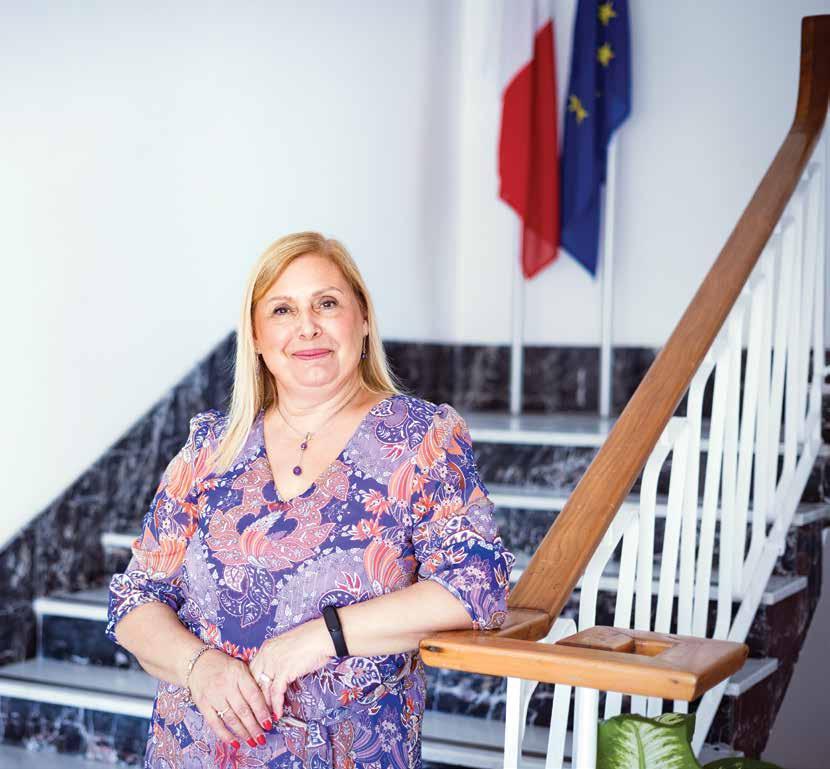
In this way, we ensure that the further and higher educational system remains relevant,” Dr Cuschieri attests.
Across all its activities, the Authority is committed to quality, transparency, and accountability in education.
“We operate on these foundational pillars which prioritise ethics and integrity, since we believe that these will help us navigate the evolving needs of the educational landscape.” Such transformation has been substantial in recent years, with “online teaching and learning, mobility, and the widening of
“We operate on these foundational pillars which prioritise ethics and integrity.”
diversity in educational methodologies” creating new scenarios and requiring a balancing act. “For instance, Malta is attracting many foreign students, so we need to be aware of any intercultural issues, while also opening up opportunities to all, regardless of their socioeconomic or national background. We also need to do this while safeguarding our own language, and culture, of course.”
This is no easy feat, and it is one which requires extensive collaboration with global partners. Indeed, the Authority, Dr Cuschieri says, is actively engaged with European networks and initiatives which promote high standards and quality assurance, including the Council of Europe’s educational subgroups. “Malta’s role in the Council had been absent for some time, but we’re now participants and contributors, with the Authority a bureau member of ETINED (Council of Europe platform on ethics) and EPAN (Education Policy Advisors Network).”
Furthermore, the MFHEA is a member of the Bologna Follow Up Group, as well as represented on the Global Policy Dialogue and Fundamental Values Working Groups, the Working Group on Monitoring the Implementation of the Bologna Process, and the Social Dimension Working Group. “We’re essentially involved in most of the Working Groups; that’s a feather in our cap and, indeed, the more we get involved, the more we network and the more our expertise is sought, so it’s a domino effect.”
Moreover, the entity collaborates with European quality assurance agencies, “to keep abreast of any new development in the field.” Elaborating, Dr Cuschieri describes the involvement of the Authority in the European Association for Quality Assurance in Higher Education (ENQA), which represents a consortium of quality assurance agencies within the European Higher Education Area (EHEA). “We’re affiliates, but we participate in meetings and provide our input.”
Last year, the entity applied to become a full member of ENQA, to strengthen the Authority’s
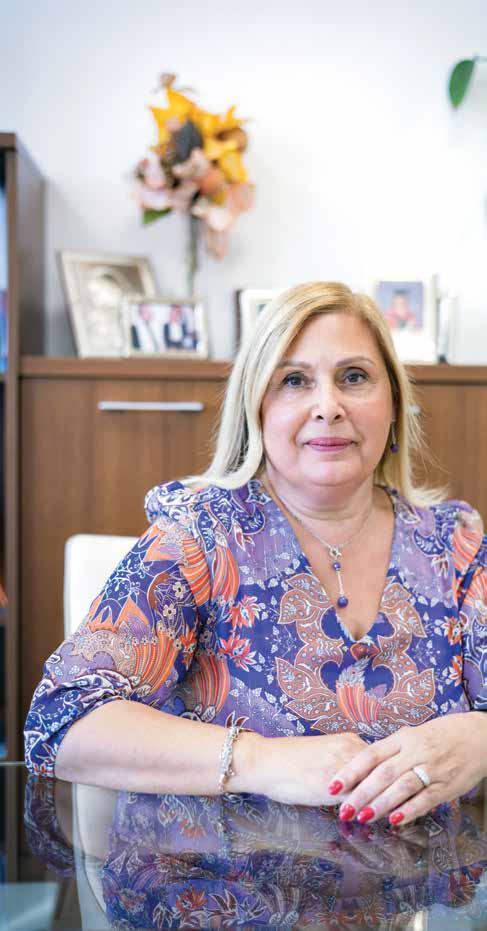

“We want to put Malta on the map, to improve our visibility and help shape the global educational landscape.”
profile. “Becoming a member would be a mark of prestige and open the door to valuable networking opportunities, so this was one of the first things we embarked on when I joined in 2018. We knew we had to work hard to become ready to submit for membership, and we needed time. We had the physical audit last October, and, hopefully, we’ll have a reply soon.”
Closer to home, the Authority also holds regular consultations with local stakeholders, and organises collaborative initiatives. “We facilitate an open dialogue and gather input to establish our policies and our practice. We have an advisory committee, formed by experts in the field and from industry – and this includes The Malta Chamber of Commerce – which has been instrumental. As a point of principle, we maintain transparent communication with all our stakeholders, while also considering their perspectives, so we understand what we need to take action on. In this way, we reinforce our identity and achieve our own objectives in improving the quality of education across the board,” the CEO says.
These close ties were crucial in the development of ‘Malta’s National Strategic Action Plan for Further and Higher Education 2022-2030’, launched by the MFHEA, together with the Ministry of Education this year. “We started the process to formulate the strategy by having an open consultation; our goal was to take a comprehensive view of the changes necessary and respond effectively to a swiftly evolving scenario. The plan is the culmination of extensive collaboration –we, effectively, codesigned the strategy with national
and international benchmarks in mind, and with an understanding of where we want to get to by 2030, and that is the creation of a dynamic and resilient knowledge ecosystem,” Dr Cuschieri attests.
This is set to have a substantial impact on individuals keen to continue their education journey. “We want to inspire them and equip them with the necessities so that we, as a society, are able to move towards a more digital and greener economy. We are confident that this strategic plan will pave the way to significant advancements in Malta’s educational system, fostering growth and sustainability for future generations,” she affirms.
Dr Cuschieri is optimistic about the future. “In the coming months, we want to remain focused on our overall mission, to foster innovation and encourage collaborative research projects among universities and other institutions. For, every year is another opportunity for the Authority to continue its growth and success,” she smiles.
Moreover, the entity is driven to continue fostering innovation, the sharing of expertise and promoting life-long learning. “We are deepening our relationships with our local and international counterparts – we don’t just meet, but we exchange ideas and experience. We want to put Malta on the map, to improve our visibility and help shape the global educational landscape. We have a wonderful team here, and I believe we will succeed,” she concludes.
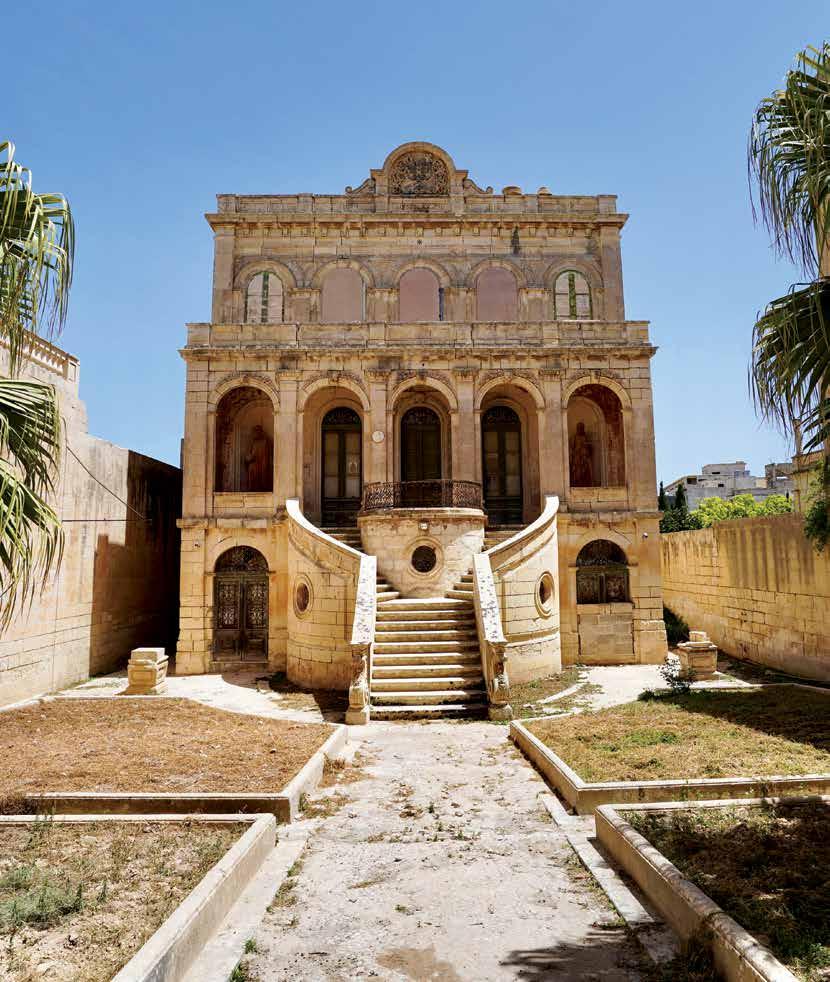
In the heart of Rabat, a remarkable restoration project is underway, breathing new life into a piece of the island’s rich history. At the helm of this ambitious endeavour is Omenaa Mensah, an art enthusiast and philanthropist whose passion for preserving cultural heritage has led her to take on the restoration of Villa Luginsland. As the founder of the OmenaArt Foundation and the driving force behind the rebranded LuginsLand of Art, Omenaa speaks to Sarah Muscat Azzopardi about weaving together threads of history, art, and community to create a tapestry of cultural significance for future generations.

“I am an art lover who believes that business, art, and charity can work well together.”
OMENAA MENSAH IS NOT YOUR TYPICAL PRESERVATIONIST. With a background that spans business, art, and charity, she brings a unique perspective to the world of historical restoration. “I am an art lover who believes that business, art, and charity can work well together,” Omenaa explains.
Her approach to running the OmenaArt Foundation reflects this philosophy: “For me, running a foundation is not different from running a business. But I don’t just focus on making profits. I want to use art to help others, which is the most beautiful way of using your business skills.”
This holistic approach has led her to take on the restoration of Villa Luginsland, a project she describes as her dream. “Malta holds personal significance for me, and I always had a soft spot for historical buildings,” she shares, revealing, “I am fully committed to restoring the Villa to its former glory.”
Before delving into the specifics of Villa Luginsland, Omenaa explains the broader context of her work through the OmenaArt Foundation. With a mission to champion a holistic integration of art, design, and architecture while also engaging in significant philanthropic activities, one of the foundation’s flagship events is the Grand Charity Auction TOP CHARITY, which its founder describes as “one of the most prestigious events in Europe that promotes the best Polish and international artists.”
Omenaa


“When you enter the Villa, you can feel the history surrounding you. Every element tells a story, and it’s inspiring when you think about the past of this place.”
And its success is staggering. “This year, the Grand Charity Auction TOP CHARITY 2024 concluded with spectacular results. We raised almost €11,500,000, and it is now the biggest charity event in Europe,” Omenaa states with pride.
But the foundation’s reach extends beyond fundraising, having been actively involved in supporting innovative art projects and organising exhibitions. Notably, it sponsored and participated in the first edition of maltabiennale.art, organising a thematic pavilion titled ‘Other Geographies, Other Stories’, featuring female artists from Poland and Ukraine.
As a collateral event to maltabiennale.art, LuginsLand of Art also organised a site-specific exhibition and educational programme. The exhibition ‘Space and Time’, curated by Slovakian set designer Boris Kudlička featured works of 19 Polish and Maltese artists, including site-specific works and a selection of works from artists’ collections. The educational programme invited distinguished Maltese and international art specialists for discussion panels, each delving into various facets of art and its relationships, including architecture, archaeology, conservation, technology, and artistic legacy. The programme also offered an opportunity to explore the Villa’s ongoing construction, restoration, and preservation efforts.
Shifting focus back to Villa Luginsland, now rebranded as LuginsLand of Art, Omenaa describes the property’s rich history, dating back to 1887. Founded by German Consul Baron Maximilian Von Tucher, the Villa was designed by Maltese architect Francesco Zammit and artist Giuseppe Calì. “When you enter the Villa, you can feel the history surrounding you,” she reflects. “Every element tells a story, and it’s inspiring when you think about the past of this place.”
The historical significance of the Villa presents both opportunities and challenges for the restoration project. As a Grade I Historic Property, everything needs to be preserved in its original architectural form, requiring close collaboration with the Superintendence of Cultural Heritage. And, as one would imagine, restoring a building of this age and importance is no small feat. Omenaa and her team face daily challenges, from ensuring historical accuracy to obtaining necessary permits and complying with heritage conservation laws.
“I think that one of the biggest challenges is the constant discovery of new historical and archaeological findings,” she reveals. “It is remarkable how much we continue to uncover in the Villa, but unfortunately, it slows down the restoration.”

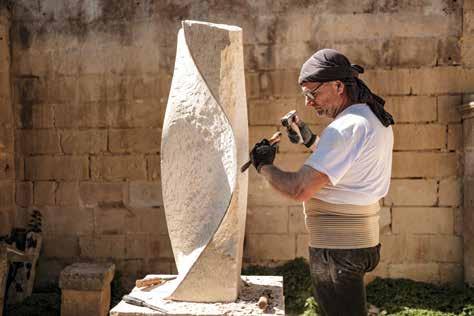
These discoveries also bring excitement to the project. During their research, Omenaa’s team uncovered intriguing details about Baron Von Tucher, including hints that he might have been a spy. “Unfortunately, many documents have gone missing over the years, and we are left with many questions without the answers,” she laments, yet still, the wealth of stories and secrets uncovered has even inspired the creation of a documentary.
One of the key challenges in the restoration process is integrating modern amenities while preserving the Villa’s historical integrity. Omenaa sees this as an opportunity for innovation. “This is what I truly love about this – combining the past with the future. Integrating modern conveniences such as electrical systems, plumbing, and accessibility features without compromising the building’s historical integrity requires innovative solutions,” she maintains. The team is also focusing on implementing environmentally friendly and sustainable solutions, adapting new technologies to work within the constraints of the original structure.
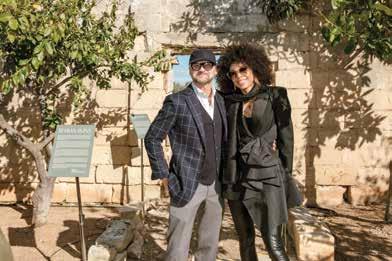
“It is remarkable how much we continue to uncover in the Villa, but unfortunately, it slows down the restoration.”
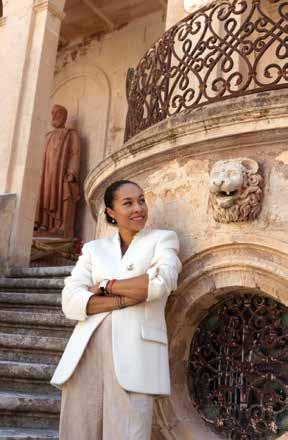
PHOTO BY BRIAN GRECH
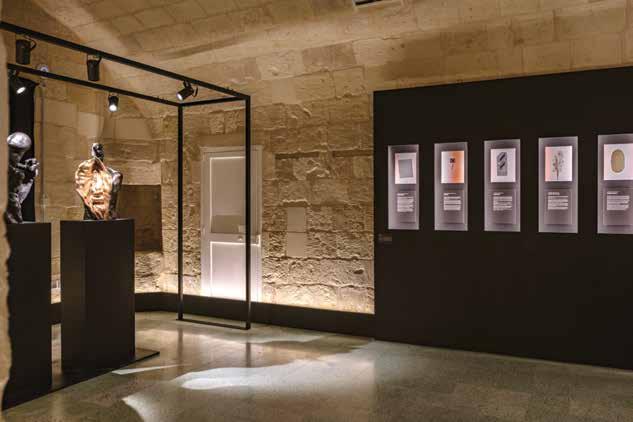
“No matter where we come from, cultural heritage serves as a bridge connecting past, present, and future generations.”
Once restored, Villa Luginsland will serve dual functions. Part of the building will be used for private purposes, while the remaining space will be transformed into a creative hub. Omenaa envisions “a space where art and business can intertwine. A space for artistic international discourse, exhibitions, and residencies.”
While the restoration is still ongoing, with an estimated completion date a few years away, Omenaa and her team are already planning for the future. This autumn, they will launch an
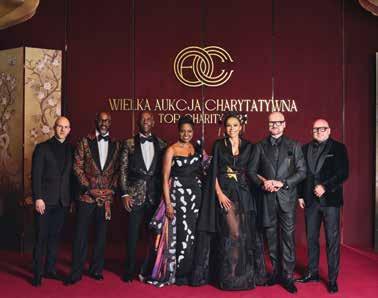
annual artistic residency programme, inviting Polish artists who have won prestigious art competitions over to draw inspiration from the Villa.
Meanwhile, the local community in Rabat has responded positively to the revitalisation of Villa Luginsland. “We received a great reaction from the local community,” Omenaa shares. “Several family members of people who lived in the Villa have reached out to us sharing some interesting facts about it.”
Beyond this, Omenaa sees the project as contributing to the broader goals of historical preservation and cultural heritage in Malta. “I aim to help develop the Maltese cultural scene and provide a platform for both local and international artists,” she states. In fact, the project also includes educational initiatives to raise awareness about the value of cultural heritage.
And as the restoration continues, Omenaa remains committed to her vision of creating a space where history, art, and community converge. Her innovative approach to preservation, combining business acumen with a passion for art and philanthropy, offers a new model for historical restoration projects.
“No matter where we come from, cultural heritage serves as a bridge connecting past, present, and future generations,” she reflects. “Preserving cultural heritage fosters a sense of belonging and continuity, allowing people to understand and appreciate their roots. I truly hope that my contribution to Maltese heritage will inspire future generations.”

BY JEAN-LOUIS

Coveted by international investors and collectors, Maltese artist Ġoxwa Borg’s paintings exude a timeless quality. Fresh from another tour-de-force solo exhibition, the Paris-based artist meets Warren Joseph Bugeja to scratch beneath the surface of her oeuvre.
PHOTO BY JO ZHOU

ĠOXWA’S BIO READS LIKE A FILM SCRIPT HEMINGWAY MIGHT HAVE WRITTEN.
While training to be a professional athlete in a local hotel pool, she impressed both actor Robert Redford and director Alan Parker with her breaststroke, becoming the latter’s village guide. When her Olympic dreams were scuppered due to a lack of government funding, Ġoxwa escaped a conservative future by shimmying down a rope made of knotted bed sheets to London, where she was accepted into St Martin’s Art School.
Her love affairs and marriages were all to men of science. “I need facts”, she says “intellectual support to balance my interior world”. In her 20s, in between throwing great parties and waiting on fancy tables, Ġoxwa studied directing at Emerson College, where she met Dario Fo and later worked on a documentary about the Amazon Forest. Boston and Manhattan were her next ports of call. There, she assisted in directing plays at Huntington Theatre and the American Repertoire Theatre for 10 years, whilst she experimented with art. Torn between the two, she
eventually chose the language of painting “because it was stronger inside of me.” Ġoxwa moved to Paris, where she won a scholarship for a year at the Cité des Arts in 1993.
Ġoxwa’s introduction to the world of art was through her nose. In the 1960s, Strada Stretta, her Valletta childhood address, was a visceral, bohemian world of live theatricals, street dancing and laughter, brawling seamen, and waitresses of easy virtue. She was sent off to boarding school, where a novel smell prompted her five-year-old self to investigate its source. Following the wafting, pungent scent of oil paint, she espied, beyond the slightly ajar door of a cell, a nun dressed all in white, painting a portrait of the Virgin on a wall.
This scene, imprinted in the impressionable young girl’s imagination, might be the reason why today, the only painting she possesses of her own work features the same subject matter. Titled ‘Madonna ta’ Giuseppi’, it is one of her early works, and was created as a dialogue between Ġoxwa and her cousin, Giuseppe. The painting immediately found a

“There is this ongoing relationship with a painting, a slow evolution; elements might fade in and out or recede into the background.”

buyer, but the night before they came to collect it, the artwork appeared to the artist in a dream, urging her, “do not sell me” – and so, she listened.
Listening is what Ġoxwa (pronounced Joshwa, the old Maltese name for Josephine) does a lot of. She creates from silence. Beginning by painting all her canvases black, she watches and waits for form to emerge from nothingness. Sometimes, a distinct or abstract figure rises from the shadows.
“There is this ongoing relationship with a painting, a slow evolution; elements might fade in and out or recede into the background,” she

explains. Some of Ġoxwa’s early work has the vivid quality of a Pompeian fresco; walls that tell tales, revealing some details and obscuring others under the flaky passage of time. The protagonists in these paintings meet your gaze with the intensity of a Russian icon. Nowadays, she says her art is “more grounded” and less transitory, although a leitmotif runs through everything that she does. “Once you leave your homeland you will always be a stranger to the familiar.”
In her landscapes, particularly her more recent ‘Red House’ series, there is this mythical longing for Ithaca, the birthplace of the eternal wanderer Odysseus, an Ithaca of the imagination, one, according to the Greek poet Cavafy, that cannot be regained. Even though the red cupolas of the churches echo Maltese skylines, in truth, she does “not know where these landscapes come from. I love buildings on water, the magic in the reflection.” Tellingly, Ġoxwa shares, “I have to miss somebody to love him.” Absence looms large in her paintings.
Bathed in northern light reflected in from the large windows in her high-ceilinged Montparnasse atelier and home, once the studio of President Pompidou’s favourite painter, Pierre TalCoat, Ġoxwa spends up to 10 hours a day painting. She will work on several paintings at once “like a dancer fencing”, waiting for each in turn to “talk to me”, often forgetting to eat and only prompted to do so by her husband who will gently push a plate of food in front of her as dusk falls. “I am obsessive about work. I get depressed if I don’t paint. I try to paint each day, and if I don’t, I do it in my mind,” she states emphatically.
Often, she listens to plays, music, or news on the radio. “Stories inspire me. Literature is like eating good food,” she says. Using a palette knife, she layers her canvases in thick impasto strokes of the quick-drying oil-and-wax-based medium she uses, building up volume in splotches of colour.

“Stories inspire me. Literature is like eating good food.”
The dramatic painting of a black bull, charging towards the viewer below a blood moon and a swathe of red cloud, symbolic perhaps of a muletaor the tragedy due to unfold, depicts a story inspired by news of a matador’s death on the radio. A fervent advocate of animal rights, Ġoxwa wanted to portray the “bull as a hero, not a victim.” The painting now hangs on a close friend’s wall in Gozo.
Another sad item of news, that of the body of a migrant Syrian boy washed ashore on a Greek beach, prompted the painting ‘Milly’s World’, where a young girl wearing a dress whose hues have been lifted off the dead Syrian’s clothes, lies on a similar beach, but with her mouth open breathing, because “this is what childhood should be like.”
It appears Ġoxwa’s paintings belie their original sources, subverting hopelessness into hope, despair into beauty. Sitting opposite the artist, sipping banana smoothies in a hotel café, Ġoxwa exudes a rare humility that co-exists effortlessly with her natural sophistication. Behind her dark sunglasses and the smoke from the occasional cigarette, she has managed
to nurture a delicate naivety in all her songs of innocence and experience. The child is very much alive in the woman in front of me, which is perhaps why many of her figures are of young or teenage girls.
On an Egyptian sojourn, Ġoxwa fell in love with the timeless Fayum mummy portraits. A girl named Melissa, whose Mediterranean features are “the reincarnation of one of these Graeco-Roman portraits”, was her model between the ages of nine and 18. As it happens, Ġoxwa’s Nile paintings were the making of her as an artist. A chance encounter in 1998 with Jean-Marie Felli, one of the most important art dealers in France, led to her portfolio finding a home in the prestigious Galerie de l’Europe on the Rue de Seine.
Still, despite being impressed with her technique and the ageless quality of her work, so different from the conceptual art being bandied about at the time, she was not considered the right candidate for the then-upcoming Art Paris exhibition. That changed overnight however, when a member of the Art Paris board visited Galerie Felli prior to the make-or-break show, and was mesmerised by Ġoxwa’s portfolio, choosing her over the selected contemporary artist.
Ġoxwa’s reputation was sealed. From her first major show in 2001 in Paris to her dramatic opening at Axelle Fine Arts gallery in Soho in New York, as well as others in San Francisco and New Orleans, and her latest solo show at the Galerie Felli in the Marais this past June, her paintings sell like hotcakes.


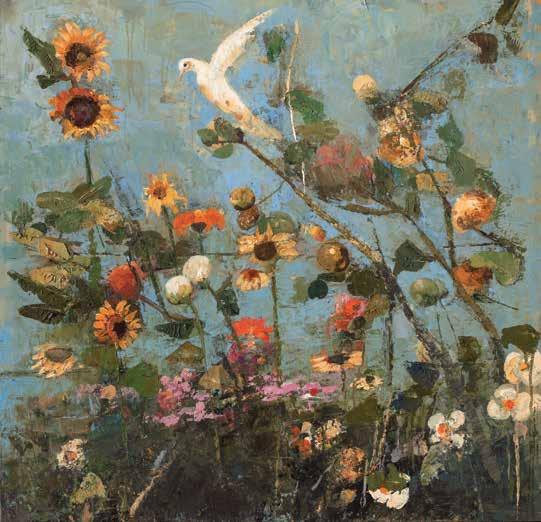
“Art is about life and death. To be an artist is to feel pain.”
Across the pond, from 2000 until his death in 2015 in a handgliding accident, Bertrand Delacroix, her American art dealer, had an unwavering belief in her talent, which he carefully curated. One year, he instructed her to paint up to 70 paintings (which left her utterly exhausted), such was the demand for her work. Thanks to the determination of her Parisian and American art dealers, Ġoxwa’s oeuvre commands five-digit price tags, which means she has many international collectors who see her art as an investment and snap it up before the paint has barely dried.
Ġoxwa has no say in how much an artwork is priced and only turns up to a vernissage or opening if it is in Paris. She paints for herself, only very rarely accepting commissions. However, because the prices of her art cannot go down, she has turned to a technique called marouflage to make her art more accessible to young collectors.
Marouflage, she explains, is a process that transforms part of a high-resolution digital print of an original painting onto a wooden panel and reworks it in oil and wax to create a singular work. With marouflage, she can set her own prices, as these do not compete with her paintings.
Our conversation returns to Ġoxwa’s current odyssey to find her own ‘red house’ – a quest to replace her beloved atelier, which she will eventually have to give up once the lease is terminated. This weighs heavily on Ġoxwa’s mind, and she tears up speaking about it, expressing that she will never be able to replicate the aura of that studio elsewhere.
She also talks lovingly of her long-time neighbour and mentor, the writer Robert (Bob) Wernick, known to locals as Monsieur Centtrois Marches – the number of stairs he had to climb to reach his apartment. Bob famously interviewed Marilyn Monroe while eating ice-cream and riding a Ferris wheel. He wrote that ‘Marilyn Monroe’ was a character Norma Jean could switch off and on at will. Ġoxwa once painted the Marilyn Bob knew, a vulnerable artist but also not a victim. In the painting, there are intimations of impending mortality in Marilyn’s wispy sensuality. Again, the red swathe features in the distance, seeping through the darkness. It was sold immediately.
“Art is about life and death. To be an artist is to feel pain,” Ġoxwa declares softly. Her paintings speak of the pain of separation, of revealing what lies beneath, constantly navigating against security to avoid complacency – certainly something this artist cannot be accused of. “Otherwise, you would be repeating. To create is to be always on the edge; a painting never feels finished. I’m always doubting, even as a painting is leaving the studio, perhaps I could have done a better job.”
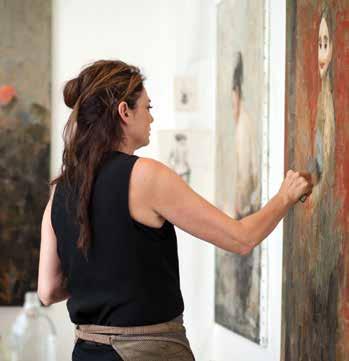
With a distinguished career in architecture and a deep-rooted passion for Malta’s cultural identity, newly appointed executive president of Din l-Art Helwa Patrick Calleja brings a wealth of experience and a fresh perspective to this pivotal role. Sarah Muscat Azzopardi discovers what he has in store at the helm of Malta’s National Trust.
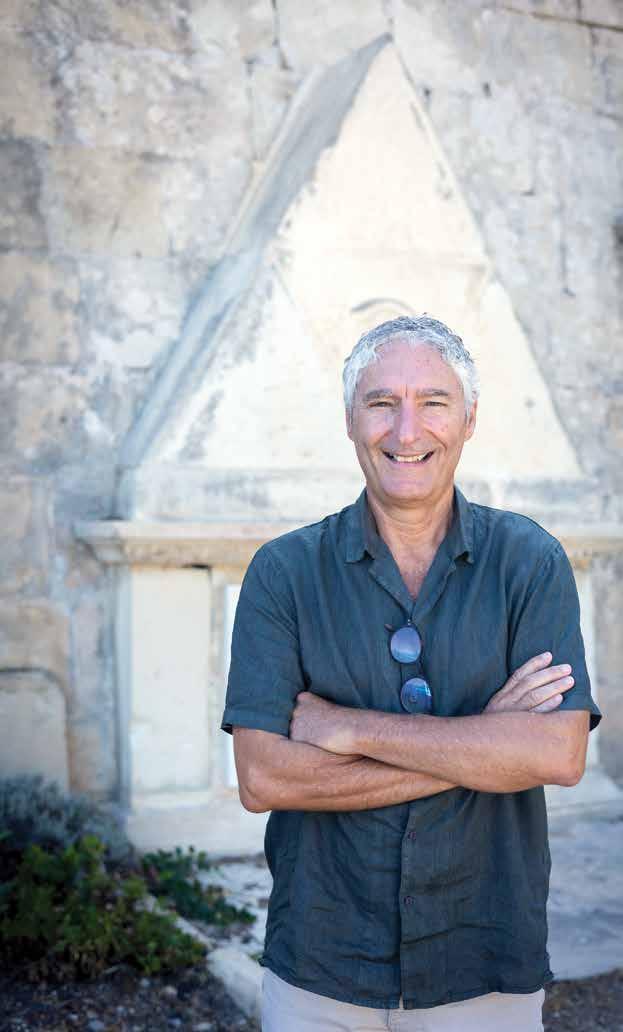
PATRICK
CALLEJA’S JOURNEY IN ARCHITECTURE
IN 1989, MARKING THE START OF A CAREER THAT WOULD SEE HIM DEEPLY INVOLVED IN SHAPING MALTA’S BUILT
His early professional years were spent at the Department of Civil Aviation, where he gained valuable experience in public sector projects. However, it was during his involvement in the construction of Malta’s airport in the 1990s that the architect began to truly appreciate the intersection of modern development and cultural heritage.
“I began my career at the Department of Civil Aviation,” Patrick recounts. “From there, I joined a building consultancy services firm, and was involved in developing projects like the Bugibba Holiday Complex, the Coastline Hotel and the Radisson.”
This experience in large-scale projects would prove invaluable, but his true passion lay in a more intimate approach to architecture. In 1994, coinciding with a significant personal milestone, he made a pivotal decision: “My wife and I were expecting twins in 1994, and I decided it was time to set up on my own.”
Reflecting on this decision, Patrick adds, “I always wanted to remain a smaller practice. I never really wanted to have a big practice because I enjoy my own time, to do other things. At the time, I played football with Sliema, and wanted to be able to continue that.”
This decision to maintain a smaller, more focused practice allowed the architect to dive deep into projects that resonated with his passion for heritage preservation. Over the years, he became known for his work on historic buildings, particularly in urban conservation areas. “I think that people know me best for the Lombard Bank jobs,” he notes, highlighting Lombard Bank’s penchant for investing in historic sites, like their Sliema branch, which is housed within a notable 1930s building.
Patrick’s involvement with Din l-Art Helwa, however, came as something of a surprise, even to him. Founded in 1965, Din l-Art Helwa is one of Malta’s oldest and most respected non-profit, voluntary organisations. Its mission, to preserve and protect the country’s cultural built heritage and natural environment, has been a guiding light for generations of Maltese conservationists.
“I’ve been a member for a long time, but I wasn’t active at all,” Patrick admits. “I’d attend some events, but I was not an active member.”
The turning point came in late 2023, when Patrick was asked to be a judge for the organisation’s architectural awards. Following the ceremony, he was approached by then-president Alex Torpiano. “He told me, ‘Listen, will you be the next president?’” the architect recalls. “I was honoured. It was very exciting,” he smiles.
“We need to make people more aware of how the climate is changing and how this is going to affect our culture, heritage, and identity.”


“Our mission originally was to preserve and protect the cultural built heritage and the natural environment. Over the years, that mission has developed because the built environment is not just cultural buildings anymore. It’s everything happening around us, and the degradation of our urban conservation areas – which, for me, is major, because it affects our identity as people.”
As Patrick steps into his new role, he brings with him a nuanced understanding of the challenges facing Malta’s heritage preservation efforts. He emphasises that Din l-Art Helwa’s mission has evolved significantly since its inception. “Our mission originally was to preserve and protect the cultural built heritage and the natural environment,” he begins, noting that, “over the years, that mission has developed because the built environment is not just cultural buildings anymore. It’s everything happening around us, and the degradation of our urban conservation areas – which, for me, is major, because it affects our identity as people.”
He illustrates this with a poignant example: “If you grow up in Gharghur, you know it as a village. You can’t suddenly have a five-storey building on the edge of it, blocking out the church, blocking out all the old walls, blocking out the rubble walls or demolishing them.”
Under his leadership, Din l-Art Helwa is poised to tackle several pressing challenges facing Malta’s cultural heritage and environment. The new President is particularly concerned about the impact of unchecked development on Malta’s urban fabric, stating, “we’re set up to check every application to ensure it is within policy. If you have a street which is made up of two-storey buildings, for example, and someone decides to build five storeys, we’ll object, and appeal to the Environment and Planning Review Tribunal.”
Another challenge is the threat of climate change, which looms large over Malta’s heritage sites. Patrick emphasises the urgency of this issue, affirming, “the European Union’s branch of the space programme, Corpernicus, recently reported the hottest day ever recorded on planet Earth. This has farreaching implications for our infrastructure and heritage sites.” He goes on to explain the cascading effects of extreme weather events, noting, “when there’s a power cut, for example, it’s not just your air conditioners that don’t work, it’s also the pumps that pump wastewater drainage from low-lying areas back up to the eventual treatment plants. When the pumps are not working, gravity takes over, and we’ve seen the effects of this – the effluent overflows, whether it’s into the sea, onto pavements, and anywhere else.”
Tourism and infrastructure strain also presents its own challenges, the President continues. While tourism is vital to Malta’s economy, he emphasises the need for a balanced approach, positing, “we can’t just bring over three million tourists without considering the strain on our infrastructure.”
Sharing his vision for the future, Patrick outlines several key priorities for Din l-Art Helwa under his leadership, starting with the consolidation of existing properties. “We need to consolidate a number of our existing properties,” he states, highlighting the importance of keeping in touch and seeing what they need on the various sites, be it updating signage or upgrades to the facilities.

Din l-Art Helwa is currently engaged in several significant restoration projects. “We are currently busy with two major projects, one of which is the restoration of what we have termed the Australian Bungalow – a timber structure sent to Malta in the 1920s to help prospective immigrants to Australia. Interestingly, we invited some Australian visitors to take a look at it and they believe it might be the only one left in the world,” he smiles.
The second project is the San Mikiel is-Sincier Chapel. “We have recently signed a guardianship deed to restore and look after a small medieval chapel on the outskirts of Rabat called San Mikiel is-Sincier. It’s a 15th-century structure, which was completely abandoned,” he shares.
“We have recently signed a guardianship deed to restore and look after a small medieval chapel on the outskirts of Rabat called San Mikiel is-Sincier.”
A critical focus for the new President is also involving younger people in heritage preservation efforts. “For me, one of the most pressing issues is getting younger people involved,” he shares. “It’s not easy, as everyone is busy and distracted. Our members tend to belong to the older generation.”
Finally, he also sees raising awareness about the impact of climate change as a crucial part of Din l-Art Helwa’s mission. “One of my visions is to make people more aware of how the climate is changing and how this is going to affect our culture, heritage, and identity.”
Speaking of how his background in architecture provides a unique perspective in his new role, Patrick maintains, “it certainly makes a huge difference. You immediately realise whether there’s an issue with a building or a structure that is being constructed, or whether it presents s a threat to an urban conservation area. You can visualise that quicker.” It also benefits the entity’s restoration projects: “Because I’ve done a lot of restoration work, it has obviously made things much easier.”
Looking ahead, as Patrick embarks on his tenure, he brings a pragmatic approach to heritage preservation, coupled with a keen awareness of the challenges posed by climate change and urban development. His leadership promises to strengthen Din l-Art Helwa’s efforts in safeguarding Malta’s rich cultural and natural heritage for future generations.
His vision is clear: to ensure that Malta’s unique cultural identity is preserved in the face of modern challenges. By engaging younger generations, raising awareness and continuing the organisation’s vital preservation work, Patrick hopes to secure a future where Malta’s heritage continues to thrive and inspire.
And as Malta faces the dual pressures of development and climate change, the role of organisations like Din l-Art Helwa becomes increasingly crucial. Under Patrick’s leadership, Malta’s National Trust stands ready to meet these challenges head-on, working for the preservation of Malta’s unique character and rich history for generations to come.

